In this article, you will learn exactly how to do B2B keyword research to find the most relevant and profitable keywords for your products or services and industry in order to bring massive organic traffic that converts into high-quality MQLs and generates millions in sales opportunities.
You will learn how to build strong topical authority and relevancy for your website so you can rank in the top positions for your most important keywords and dominate in the search results in your industry to achieve great B2B SEO results.
But before we get started, if you learn anything new from this video, please like this video and write a nice comment below, it helps a lot! Also, subscribe for more B2B SEO actionable insights.
What is B2B Keyword Research?
B2B Keyword Research is a process of finding the best keywords for your business in order to attract your B2B target audience to your website, generate marketing qualified leads (MQLs) and revenue from your SEO and content strategy, and be able to grow long-term and remain competitive.
Modern keyword research is about understanding your industry and creating semantically related content that targets all the terms, facts, and entities within your industry on your website in order for Google to recognize you as an expert source for your industry.
This means your B2B keyword research will be heavily influenced by Semantic SEO in order to create topic relevancy on your website and let Google recognize you as an industry expert and source of information for your industry.
Why Do You Need B2B Keyword Research?
If you are planning to successfully implement a B2B SEO strategy for your website, then you need to know which keywords you need to target to effectively bring relevant organic traffic that could be interested in your products or services now or later and it’s the essential part of SEO pyramid.
This means you need to understand:
- What keywords your B2B target audience is searching for.
- What keywords will bring the highest ROI.
- What keywords will help you to increase the topic authority.
- What keywords you can rank for ASAP.
And B2B keyword research will help you with that so you implement the right B2B keywords for your website so you can benefit from these three following benefits:
Generate Leads & Revenue
The first reason why you need B2B keyword research and definitely this is being one of the main benefits is it helps you to generate leads and revenue from your B2B SEO strategy for your business.
It’s important to know that 96% of B2B buyers look for content backed by thought leaders, reflecting the importance of research and authority in converting leads.
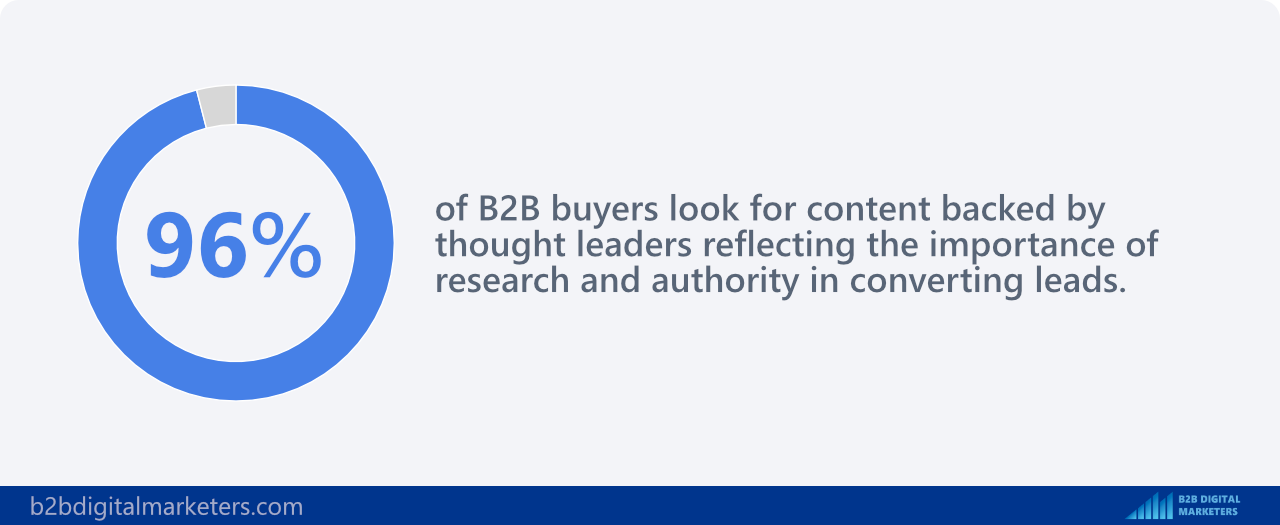
SEO is ultimately about targeting the right keywords that your audience is searching for and B2B keyword research is exactly the process you need to find the right B2B SEO keywords that will be generating high-quality marketing qualified leads that ultimately convert as customers and brings revenue for your business.
In fact, 57% of B2B marketers say that SEO generates more leads than any of their other marketing initiatives and this is because 90% of B2B researchers who are online use search specifically to research business purchases.
Increase Brand Awareness
B2B Keyword research will also help you to drive massive brand awareness among your B2B target audience and ultimately it will increase trust in your brand.
Building trust with future potential leads is one of the best ways to increase your conversion rate, smooth and speed up the sales process, and drive better quality leads for your business.
And once the time comes and they will be searching for products or services you are offering, you might be on top of their list, just because you have been building trust with them long before by targeting the right B2B keywords.
And with this B2B keyword research process you will know exactly how to build trust with your B2B target audience long before they actually need you, just like HubSpot did and because of that they’re generating 10,000s leads every single month.
Get the Highest ROI from Your B2B SEO Strategy
And lastly, B2B keyword research helps you to get the highest ROI from your B2B SEO strategy.
If you want to generate the right leads and ultimately the highest quality B2B sales leads for your company, you need to know how your audience is searching for your products or service and what steps in the buyer journey they take.
According to Gartner, your sales reps have roughly 5% of a customer’s time during their B2B buying journey and sellers have little opportunity to influence customer decisions.
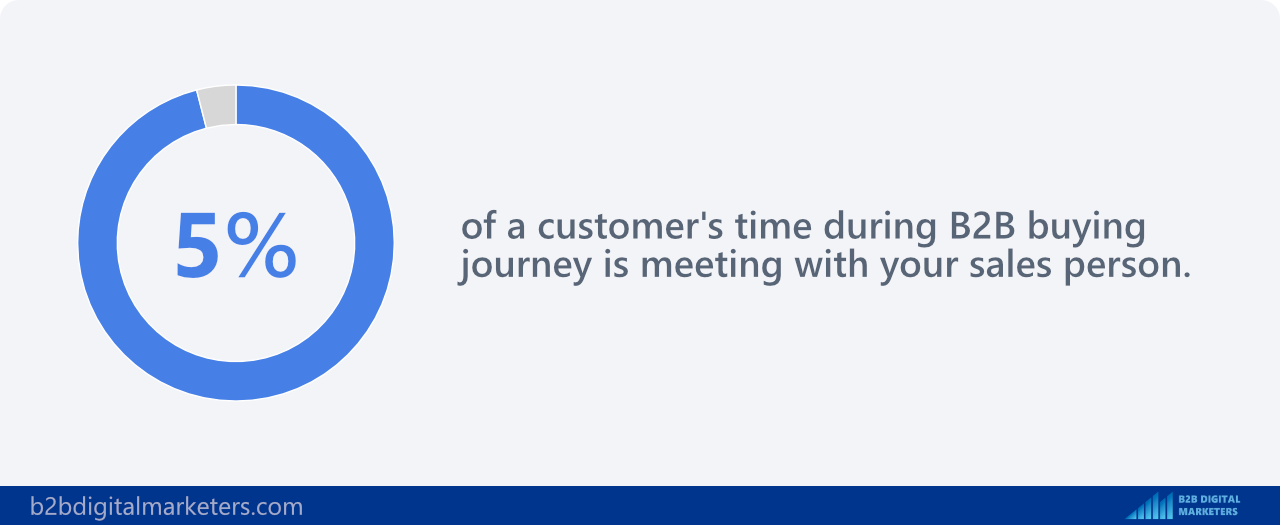
And the best way to have a certain influence on your customer decision is via informative content that helps buyers to move in the buyer journey and ease the process.
Gartner research found that customers who perceived the information they received from suppliers to be helpful in advancing across their buying jobs were 2.8 times more likely to experience a high degree of purchase ease, and three times more likely to buy a bigger deal with less regret.
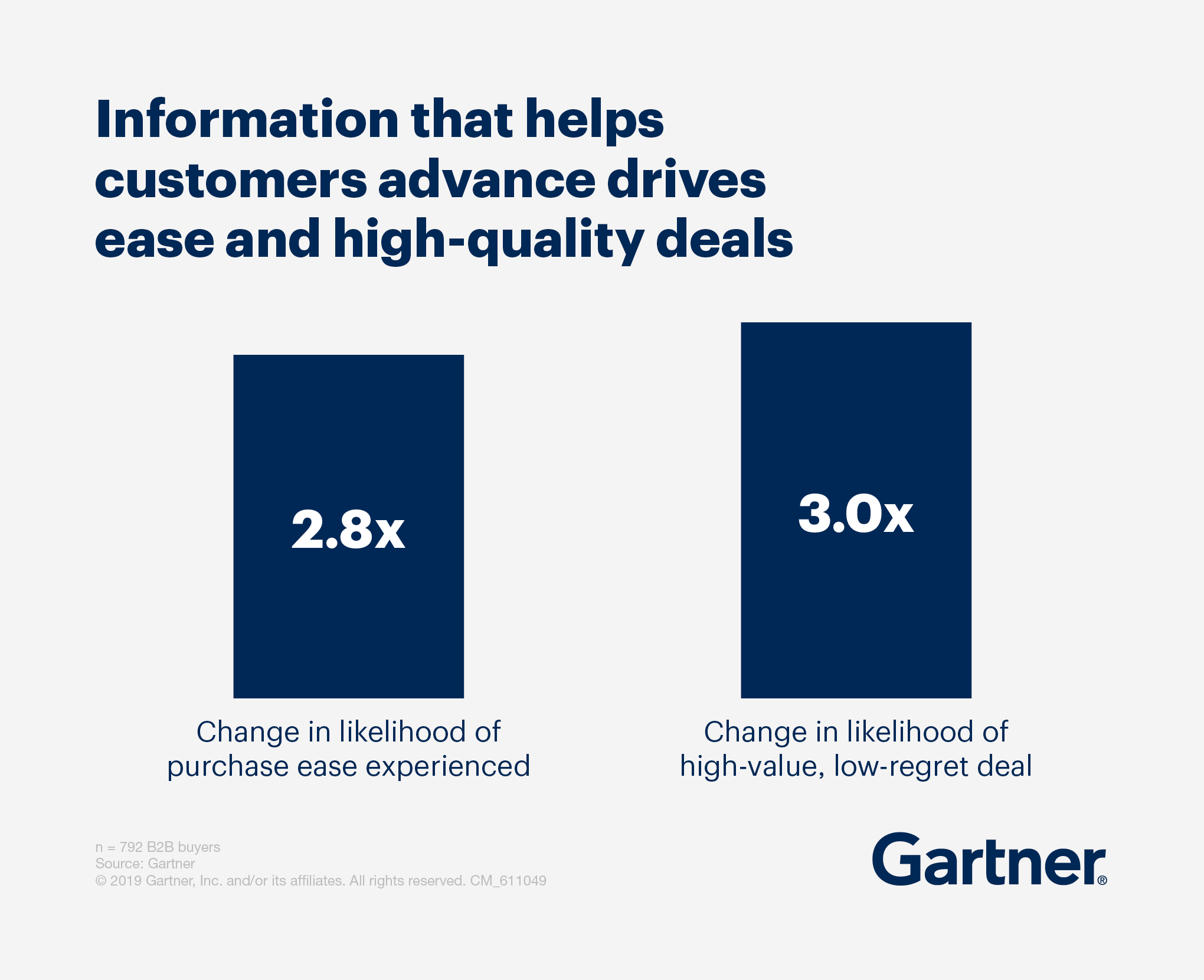
And by targeting the right B2B keywords you will be able to provide the content your B2B buyers are looking for, so you can provide the information they are looking for and steer them in your way.
Again, this helps with brand awareness, building trust, and ultimately converting them to MQLs and SQLs for your business.
B2B keyword research is an essential step to effectively implement your B2B blog strategy as well as drive the best results from your website and B2B blogging.
9 Step B2B keyword Research Process
With that, here you can see my proven eight-step B2B keyword research process to help you maximize your results from your B2B SEO in order to drive profitable organic traffic and leads and bring the highest ROI for your business.
It also helps you with your blogging for business as a large part of keywords will be targeted by your blog posts which will drive most of the organic traffic.
And before we get started, make sure you create your own keyword spreadsheet to track all your keywords along with additional information such as search volume, keyword difficulty, CPC, business relevance, and others.
Feel free to copy my B2B keyword research template. Later on, I’ll explain more about how I use some of these columns.
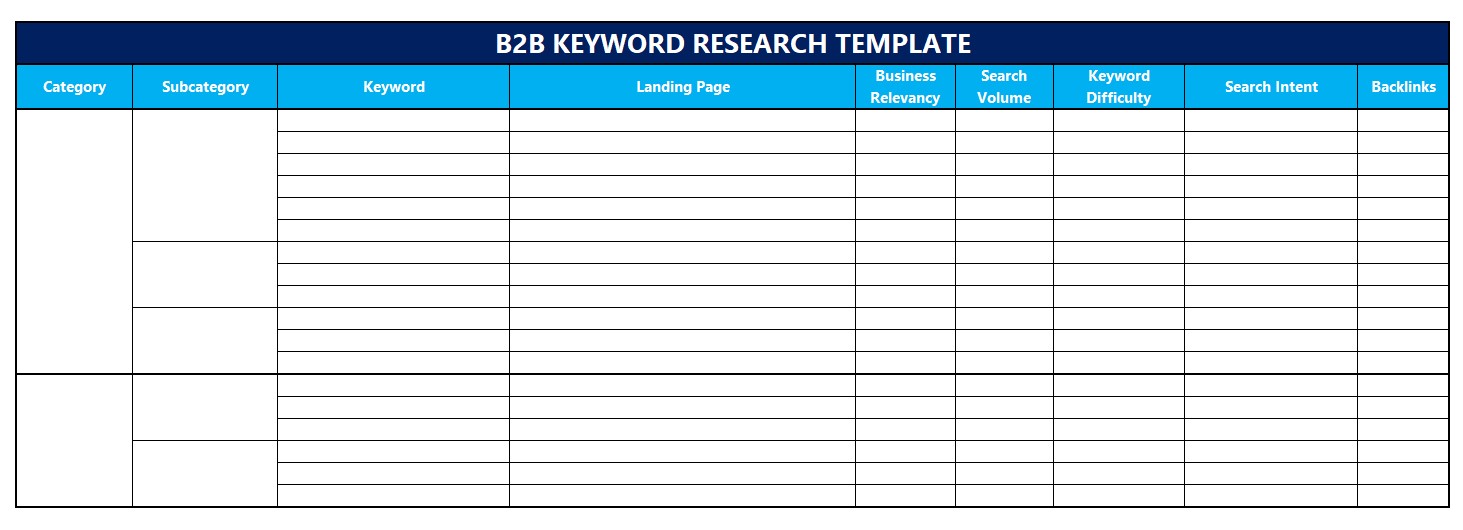
Step #1: Find Your Primary B2B Category Keyword
The first step is to find your primary B2B category keyword that generally and best describes your product or service.
The primary B2B category keyword is the main generic, short-tail keyword related to any product or service in the category and your target audience is using it to find products or services that you or your competitors are offering. It is also the main category under which your product or service is categorized.
Just like when you are shopping online you can see eCommerce stores are having every product under product categories such as running shoes, mobile phones, washing machines, fridges, suits, et cetera. Your product also has a specific category under its life.
For example, for QuickBooks, it is accounting software.
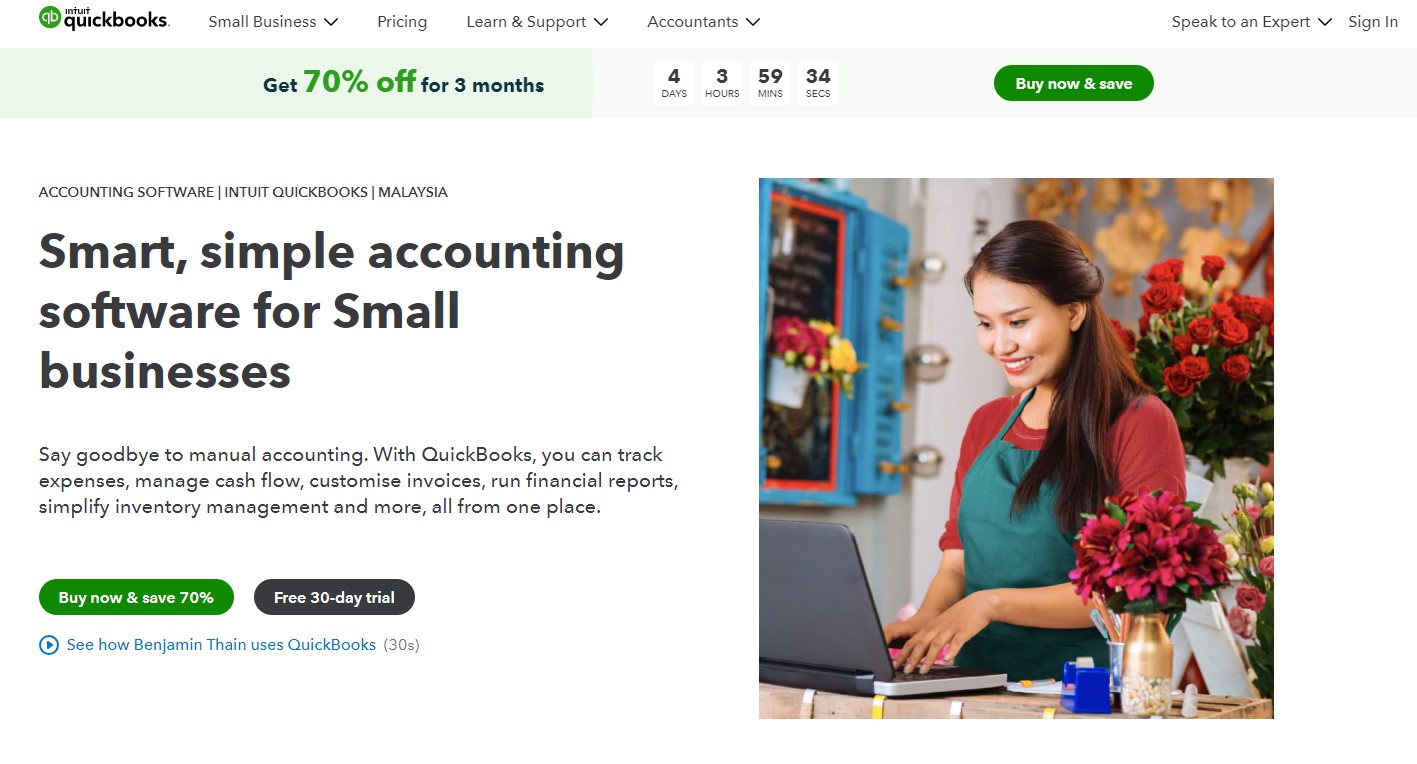
For HubSpot, the main product category keyword would be CRM Software,
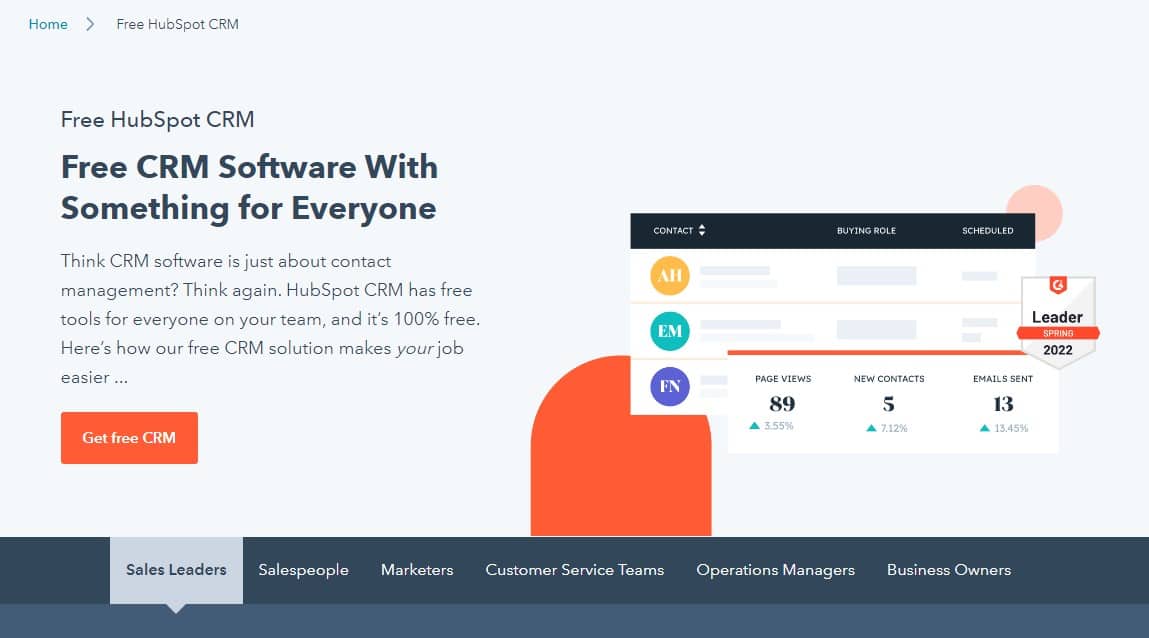
Or for Native Environmental this is industrial cleaning services.
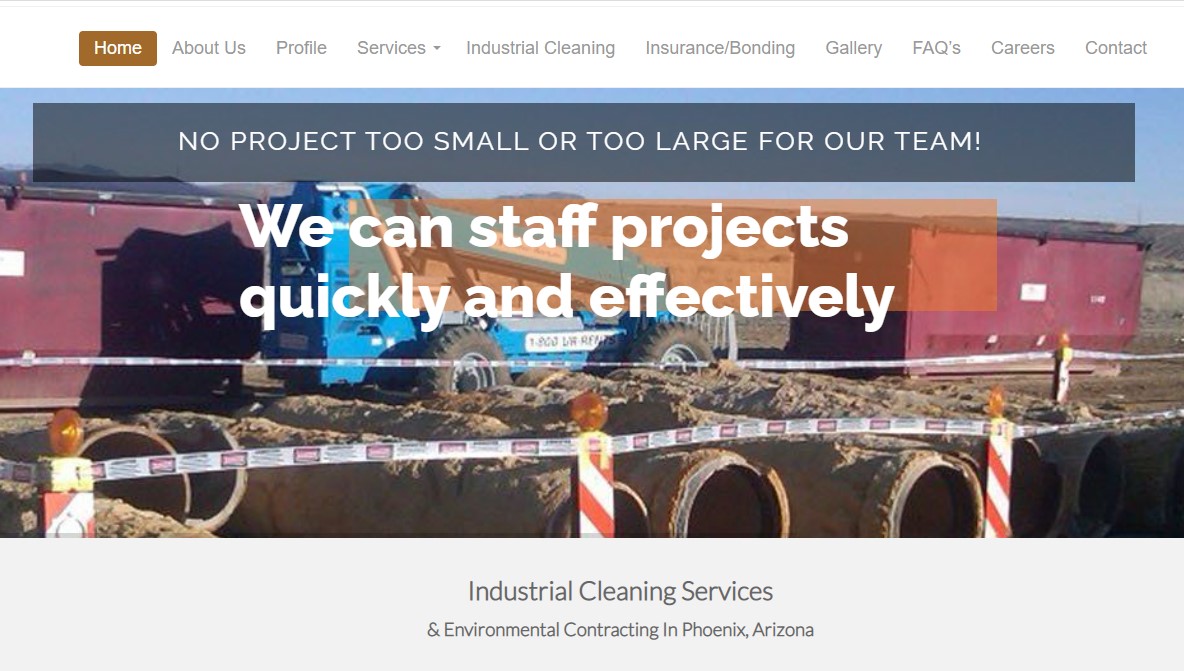
With that, finding your main category keyword will give you a solid start with your B2B keyword research.
Also, you want to be recognized as the subject matter expert by Google and your B2B audience for topics that are closely related to your products or services to rank in top positions.
Because 71% of B2B researchers begin their research with generic Google searches and as they learn more, then they narrow down search intent.
So, if you are providing different products or services you want to do this for all your products or services. Also, if your product has any other related categories or subcategories, write them down in the next step you will need that too.
For example, inventory management software could be also under order management software, product management software, or order fulfillment software.
Step #2: Create Topic Clusters
Once you know what your product or service category keyword is, the next step is to create your topic clusters.
Topic clusters mean clustering your keywords based on one main topic and then connecting them with internal links and in this case, the pillar content will be related to your product or service as your product or service will be one of the cluster contents.
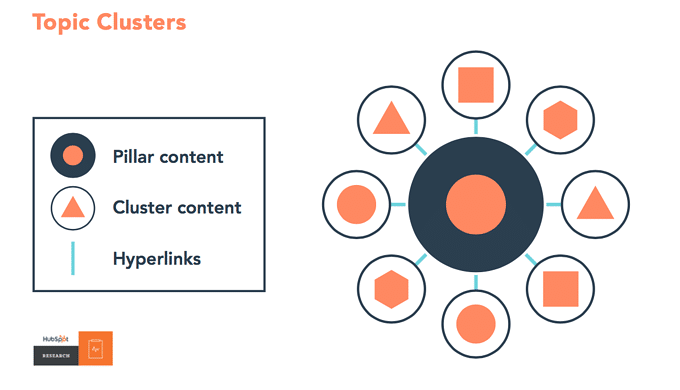
(Source)
This will help you to start creating a super relevant and important B2B keyword list in order to start building topical relevancy and authority within your industry for your website.
So, to start creating topic clusters, first, you need to get the seed keyword from your product category keyword which is super easy.
For example, if you are selling project management software then the seed keyword is project management, for inventory management software it is inventory management, for industrial cleaning services is industrial cleaning, for platting services it is platting, et cetera.
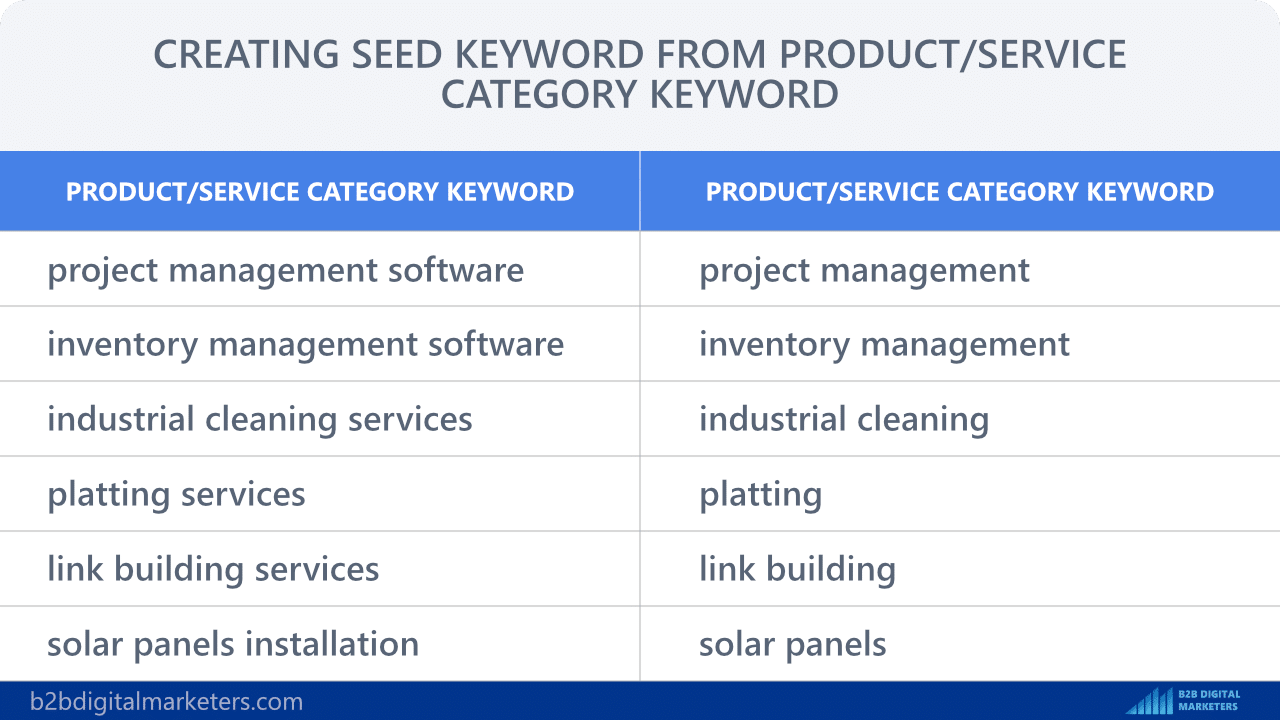
Once you know your seed keyword, then you can start creating your topic cluster by finding as many long-tail keyword variants for your seed keyword.
To do that, you can start with a keyword research tool like SE Ranking. Just pop in your seed keyword, select the target location, and click on “Analyze”. In this case, I’ll use “irish whiskey” as a seed keyword.
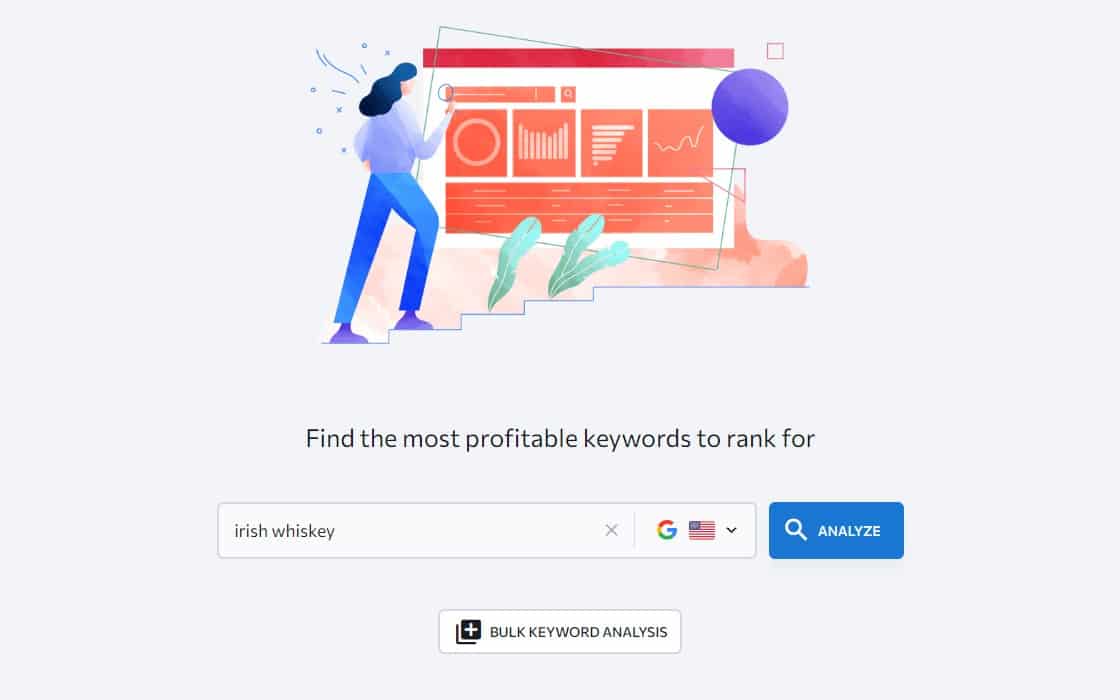
Here you will get a high-level overview of the analyzed keyword such as the keyword difficulty, search volume, CPC, and the keyword ideas. Here you will want to go to the “similar keywords” and “related keywords” reports.
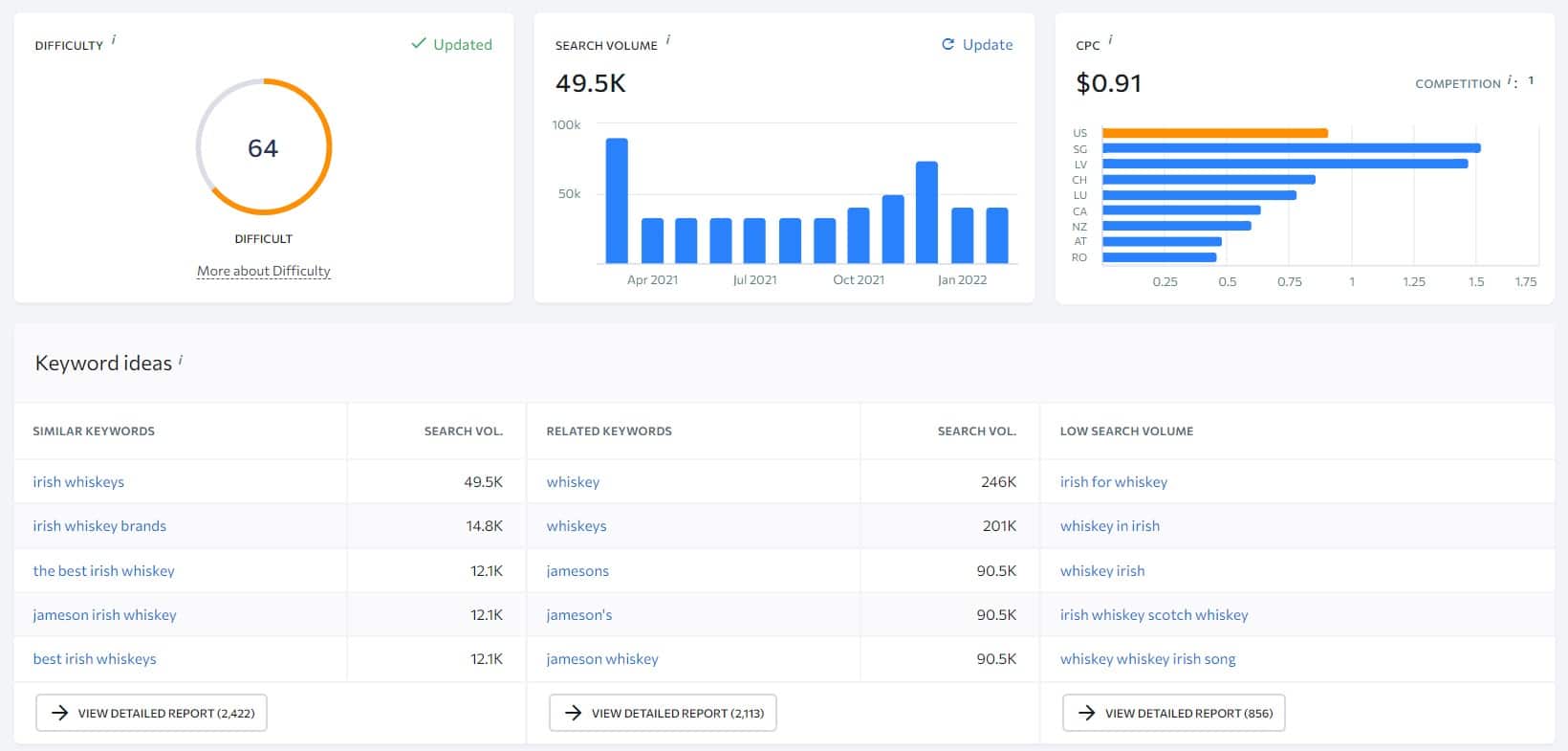
And here you will want to find as many related long-tail keyword variants as possible such as “irish whiskey cocktails”, “irish whiskey brands”, “irish vs scotch whiskey”, “irish whiskey or whisky”, et cetera.
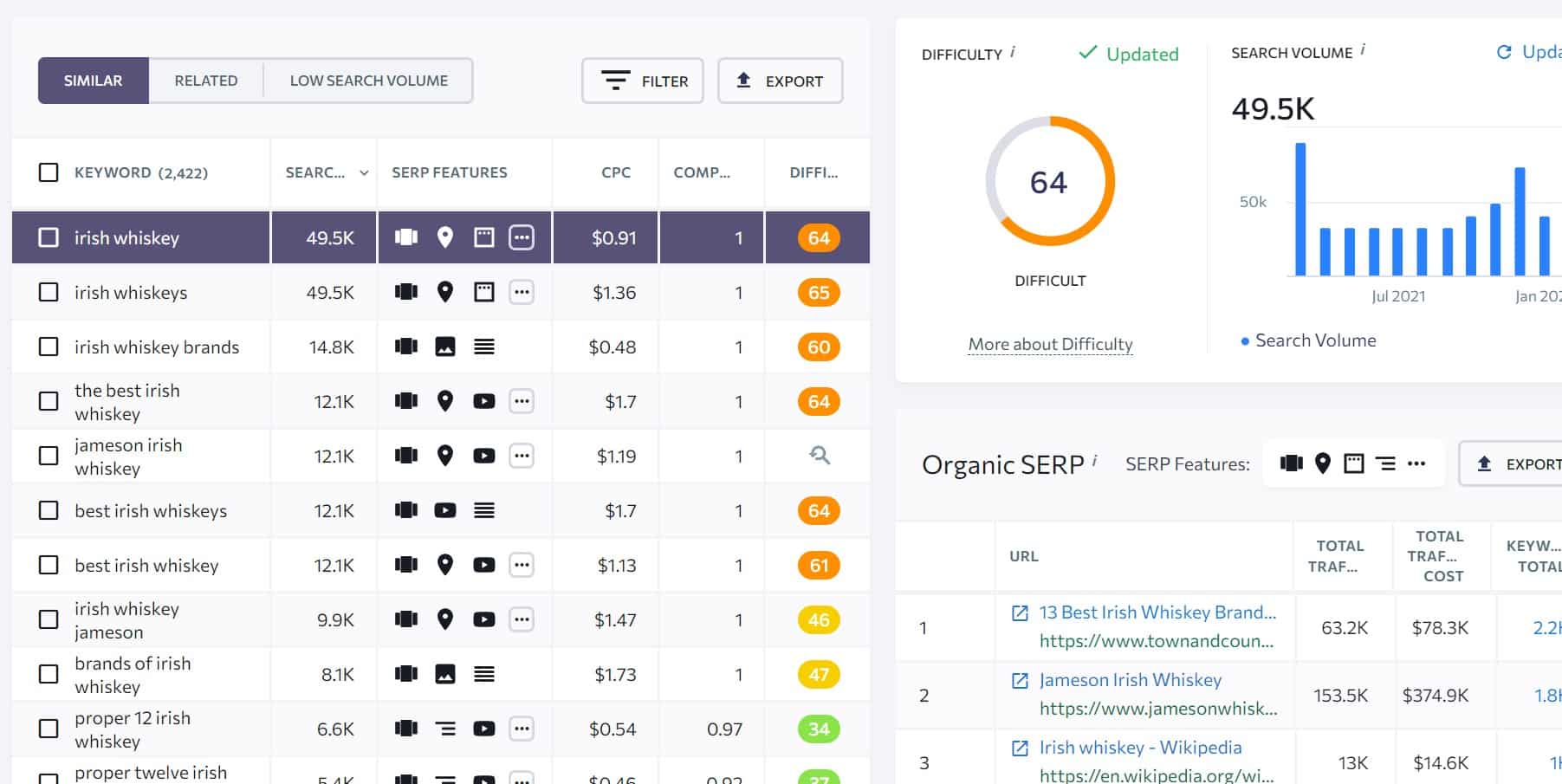
So, you can create a super relevant topic cluster.
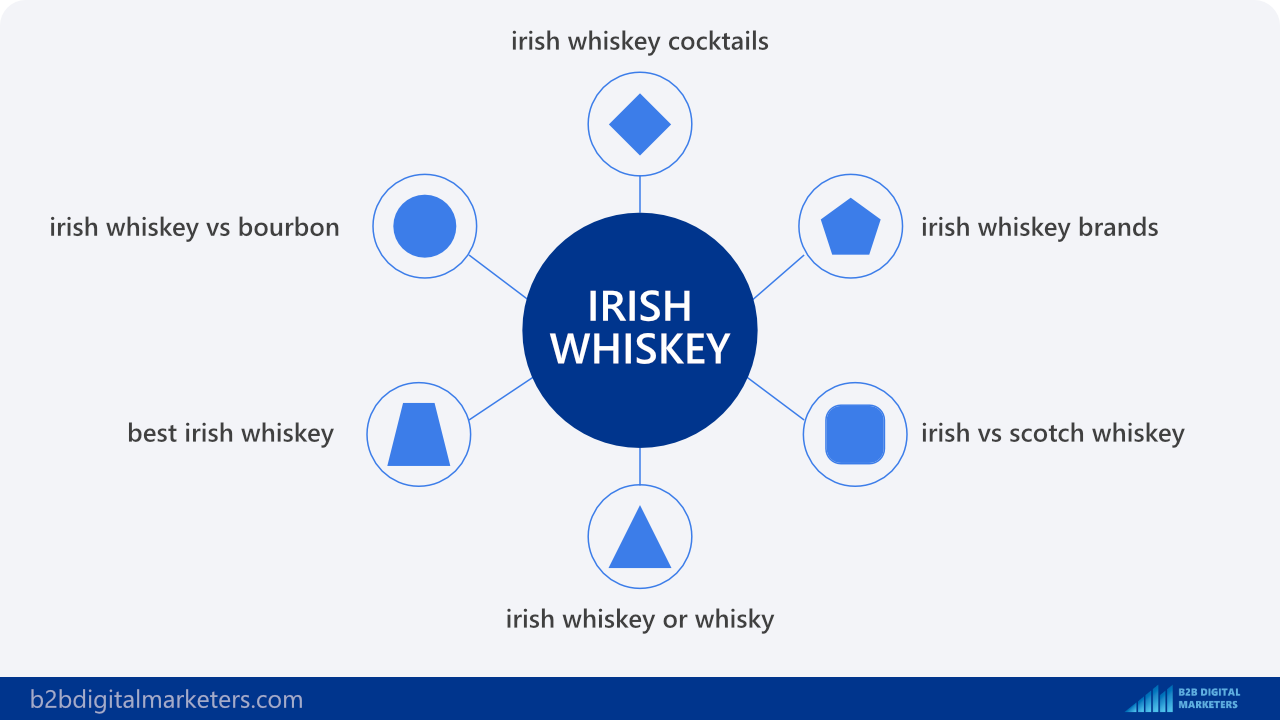
And of course, later on, once you are creating content to target the keywords from your topic clusters, you will want to create semantically related internal links from all these articles to your money page/s and of course between each other.
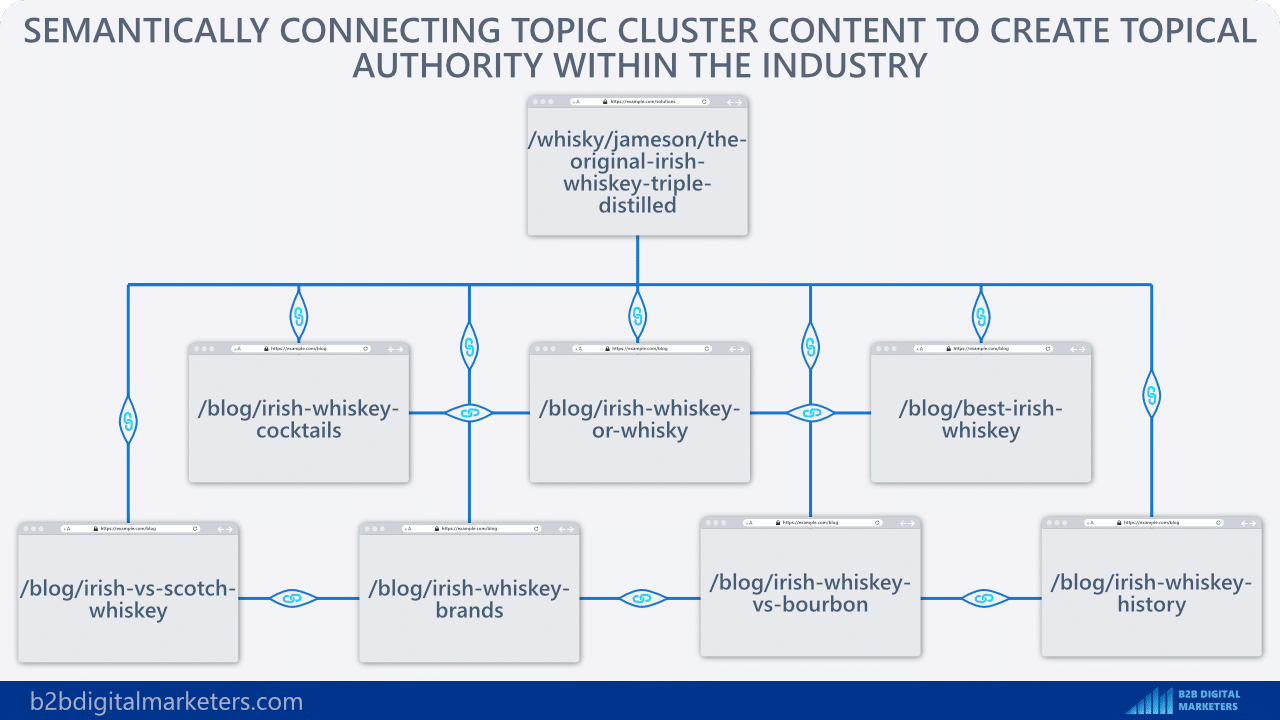
So, here is an example of what your spreadsheet should look like after this step:
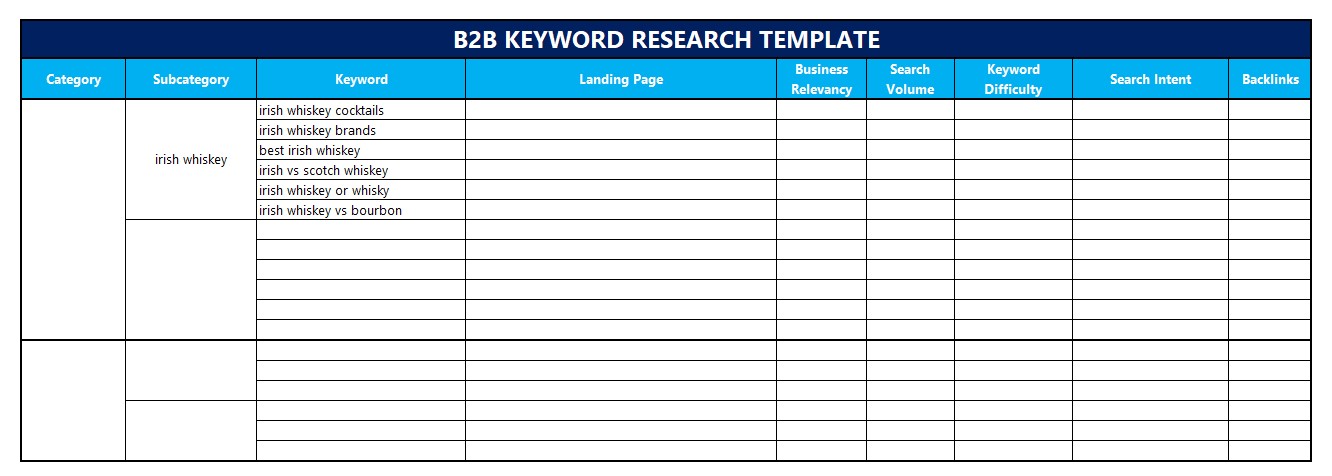
Step #3: Expand into Niche Clusters
Alright, the third step is to create niche clusters.
Of course, you will not want to create only one cluster, but create as many topic clusters that are related to your niche to cover as many SEO keywords and long-tail keywords as there are in your niche.
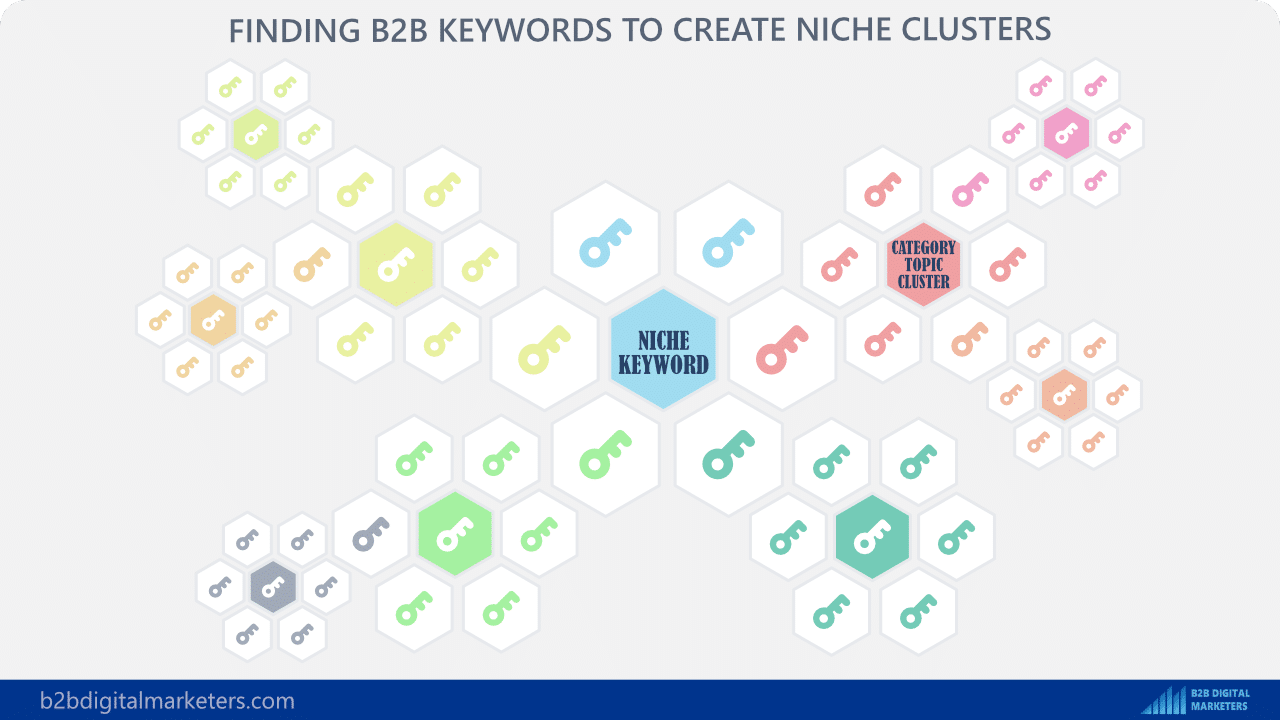
So, based on the previous example of the topic “irish whiskey” the niche topic would be “whisky” and to create your niche cluster you would find as many main topics related to the whiskey like “Japanese whisky”, “scotch whisky”, “irish whiskey”, etc.
Then again you would create your topic clusters from all these main topics.
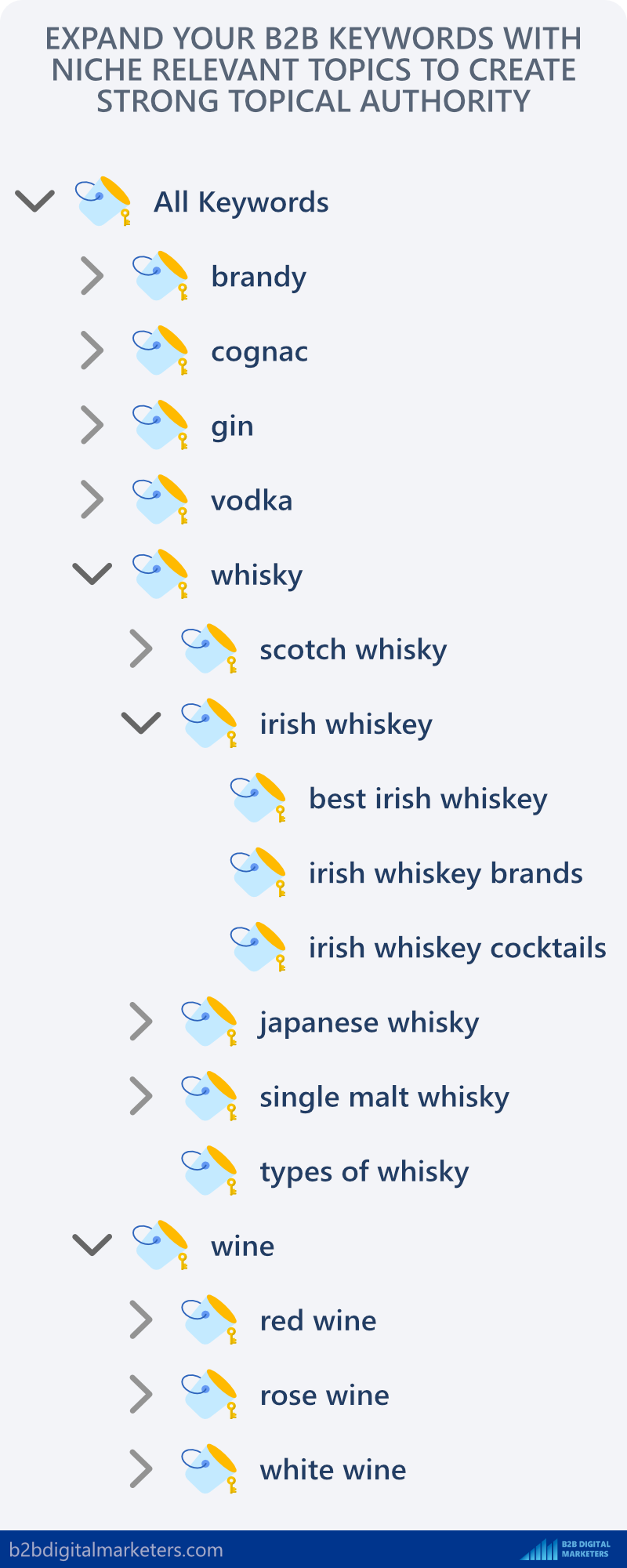
Also, you need to consider that the whisky is a topic cluster as well, therefore you should find relevant long-tail keyword variants that you can target with your content.
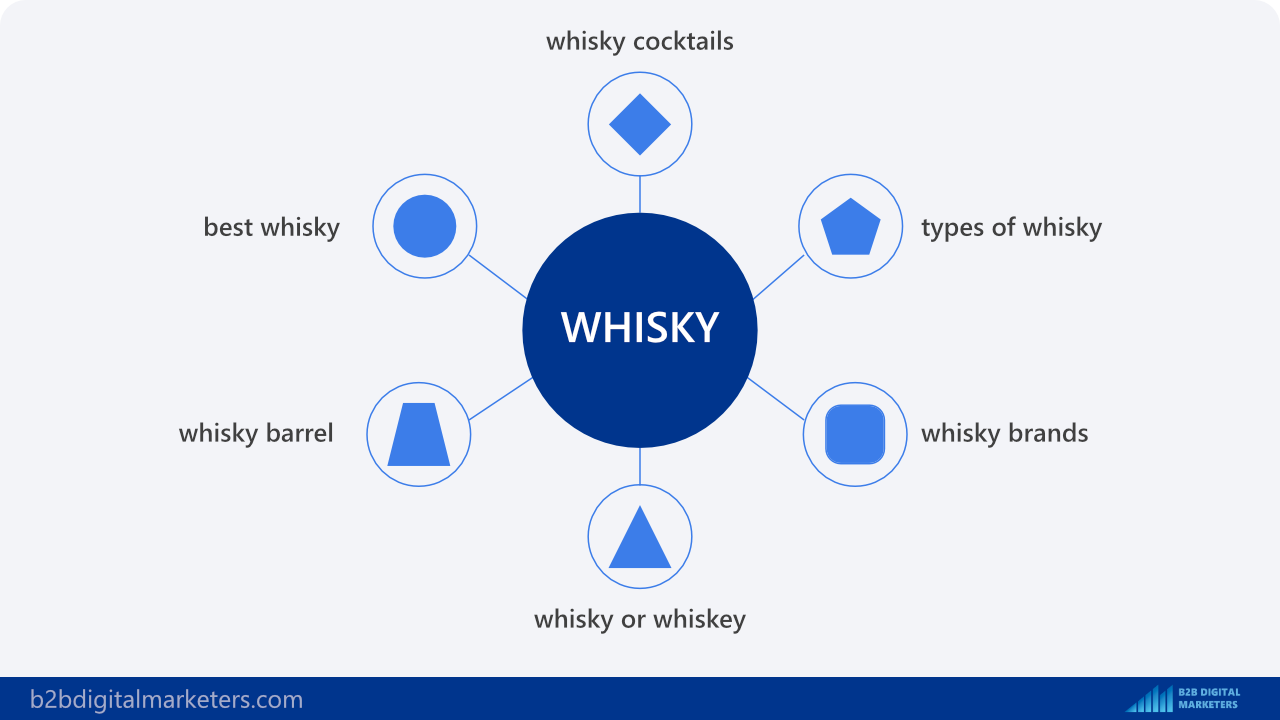
This will further help you establish topical relevance and build strong topic authority for your website and you will essentially be able to rank for the most important topics within your niche and own the search results.
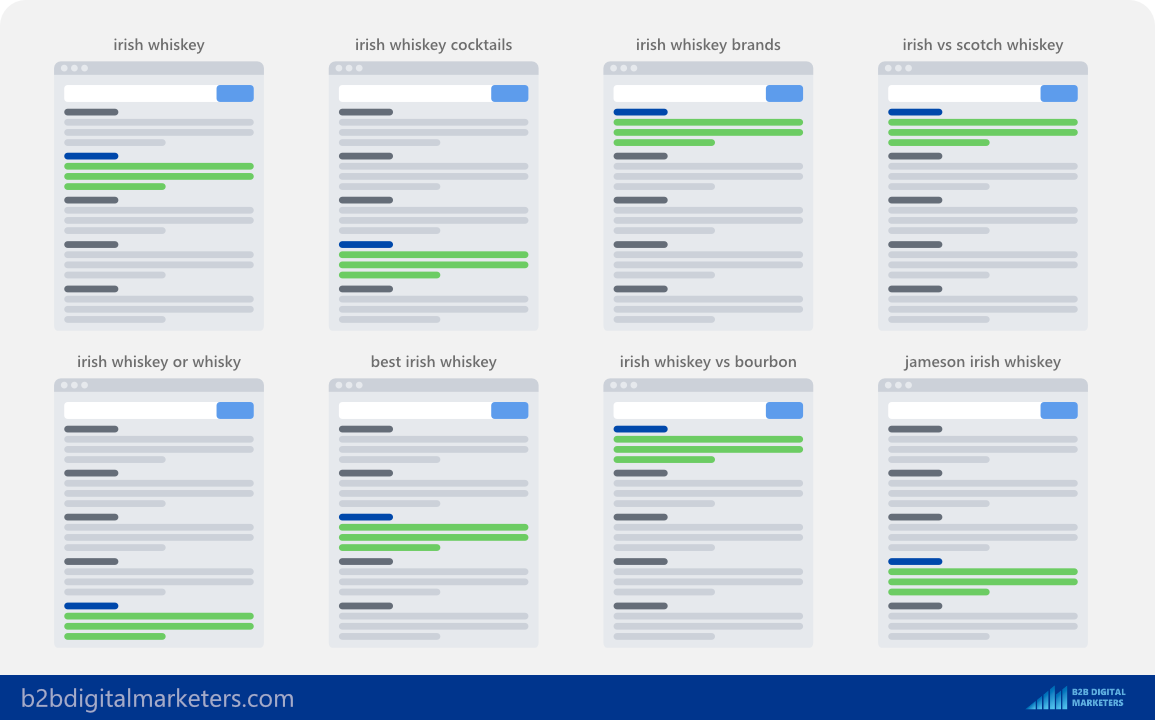
So here is what your spreadsheet should look like after this step.
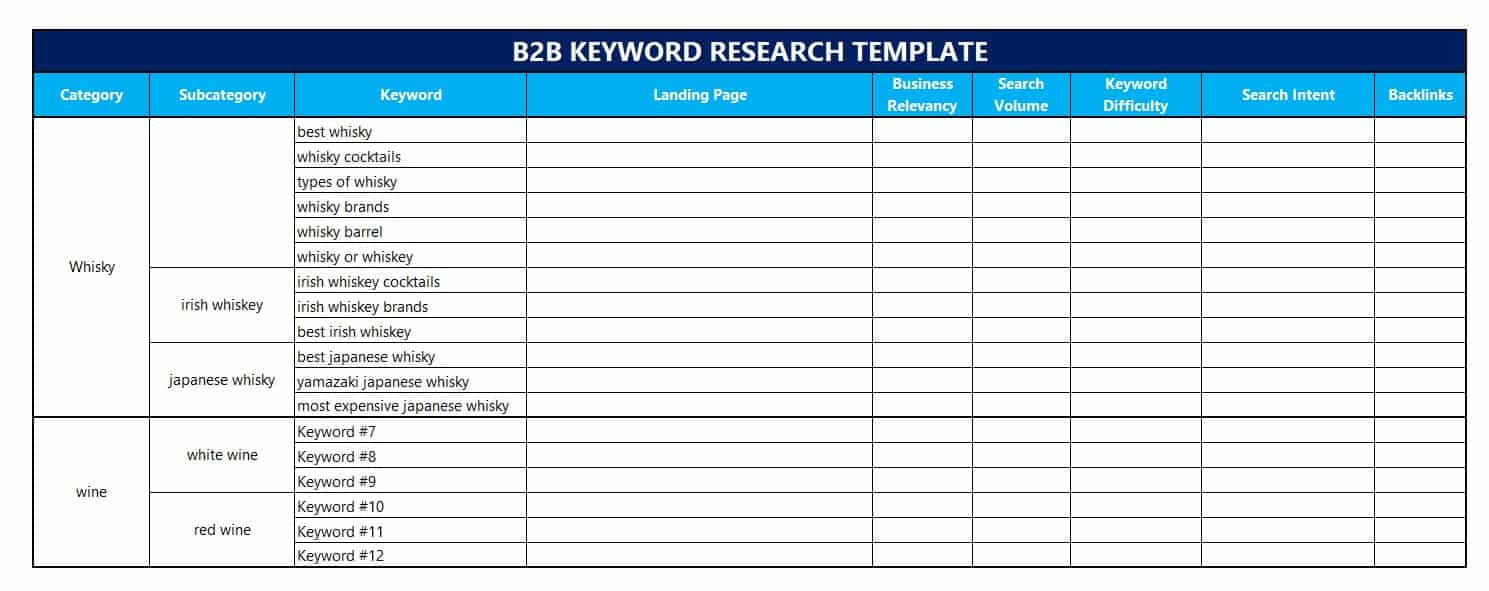
Lastly, as you are creating your list of B2B keywords, you will find similar patterns or keyword modifiers that can be reproduced across different categories and subcategories.
Step #4: Create Industry Clusters
Another step is to create industry clusters.
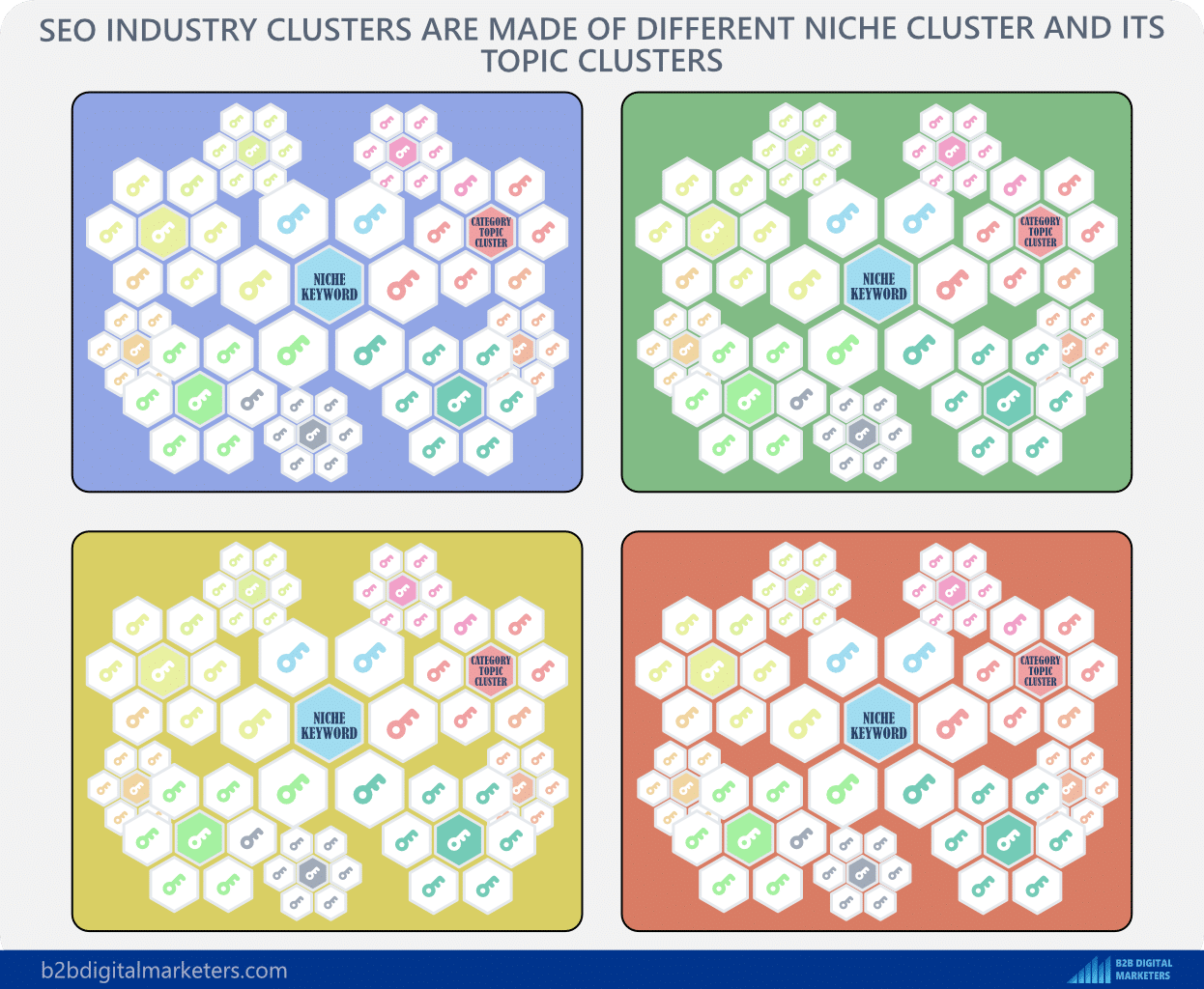
For example, whiskey is under distilled spirit, which is one huge industry. So, from this point, you would target different related niche topics like “brandy”, “cognac”, “gin”, or even “wine” and then create topic clusters from the niche topics like “red wine”, “white wine” or “rose wine” and go from there. (see the bucket picture above)
Of course, you will want to create only topic, niche, and industry clusters for the products or services you are selling.
Also, as you can see, you start your B2B keyword research with body keywords to find long-tail keywords and then move to the head keywords as you like this you will be targeting the most relevant keywords to your industry.
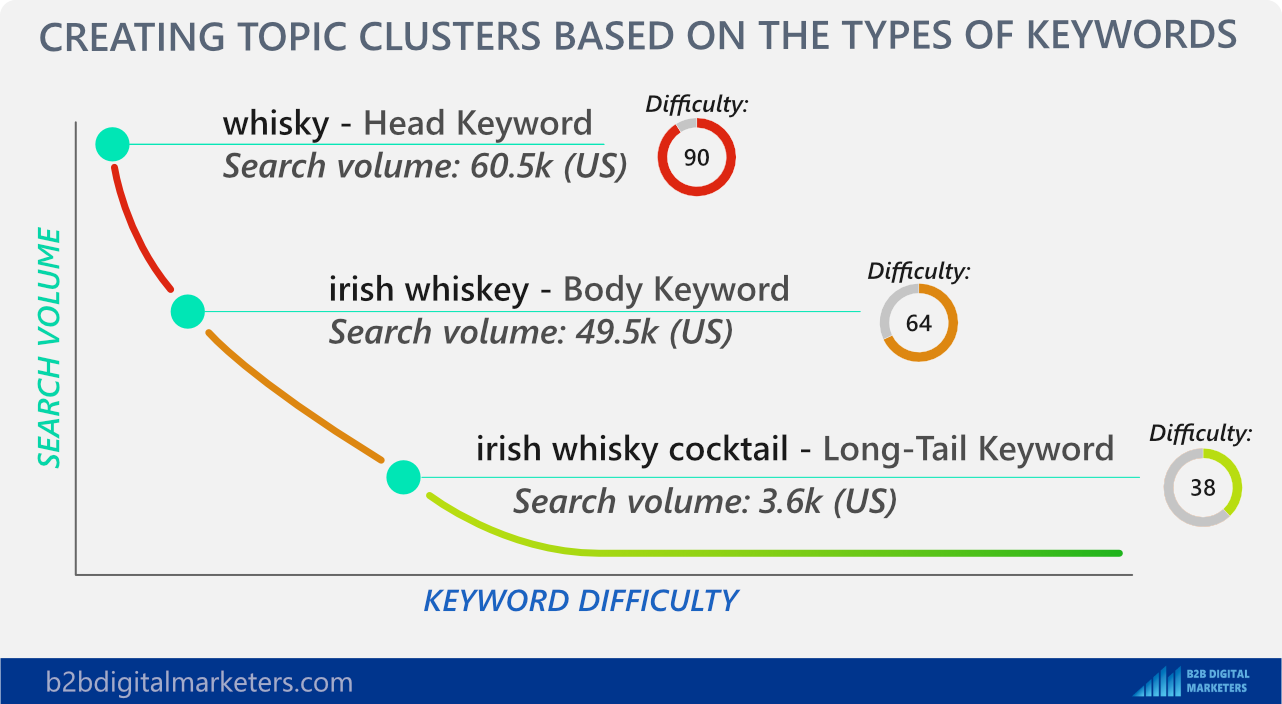
So, here is an example of what your B2B keyword research spreadsheet should look like after this step.
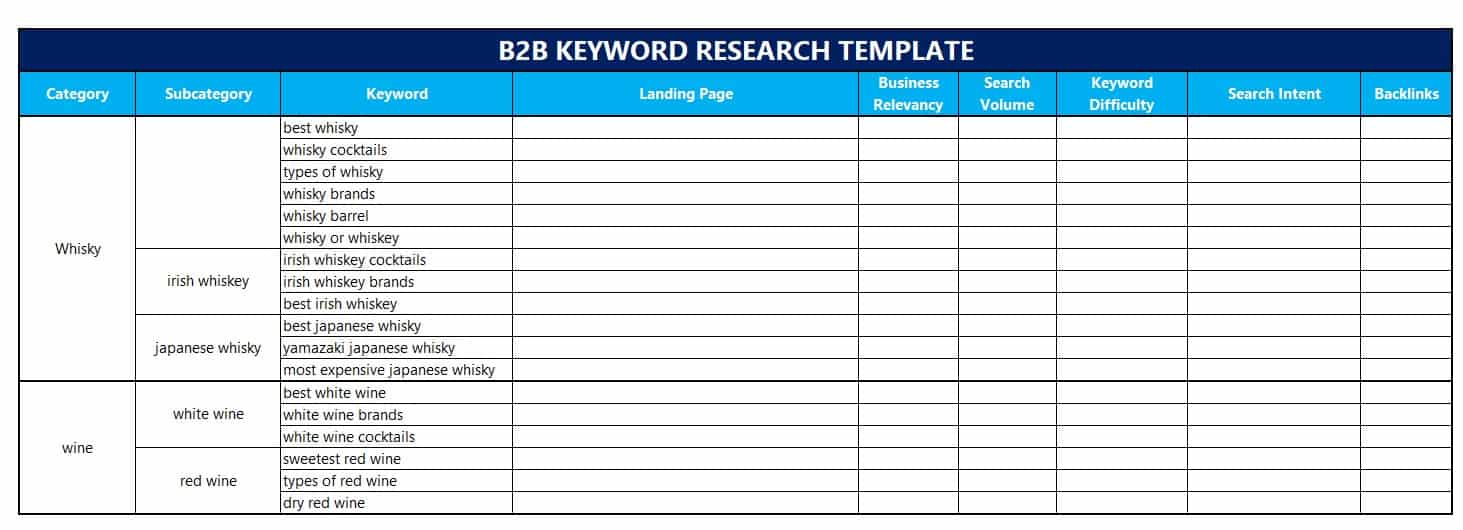
Step #5: Expand Your B2B Keywords List
Once you have created your topic, niche, and industry clusters you should have already a nice list of B2B keywords. However, this is not enough, and you need to expand your list.
This will help you if you are selling only one or a few products or services to create a bigger list of B2B keywords related to your industry.
Also, when you are picking keywords, it’s important to use common sense, that’s why having at least some knowledge of the industry will help you determine which keyword is relevant and which one isn’t.
With that, here are some of the best methods to expand your list of B2B keywords in order that I would recommend following. However, feel free to skip any of the methods if they are not relevant to your industry.
Also, for each method, I will give examples of Keyword Research techniques to expand your B2B keyword list but every technique can be used in many different ways, not just for one specific method.
And lastly, I will no longer show how to add keywords in your spreadsheet, as I hope you got the idea. Just make sure you write down every B2B keyword you find with the following keyword research techniques and methods.
1. Create More Relevant Topic Clusters
So, the first way to expand your list of keywords is to create more relevant topic clusters.
For example, if you would be in project management, another topic cluster example would be resource management, deal management, or expense management.
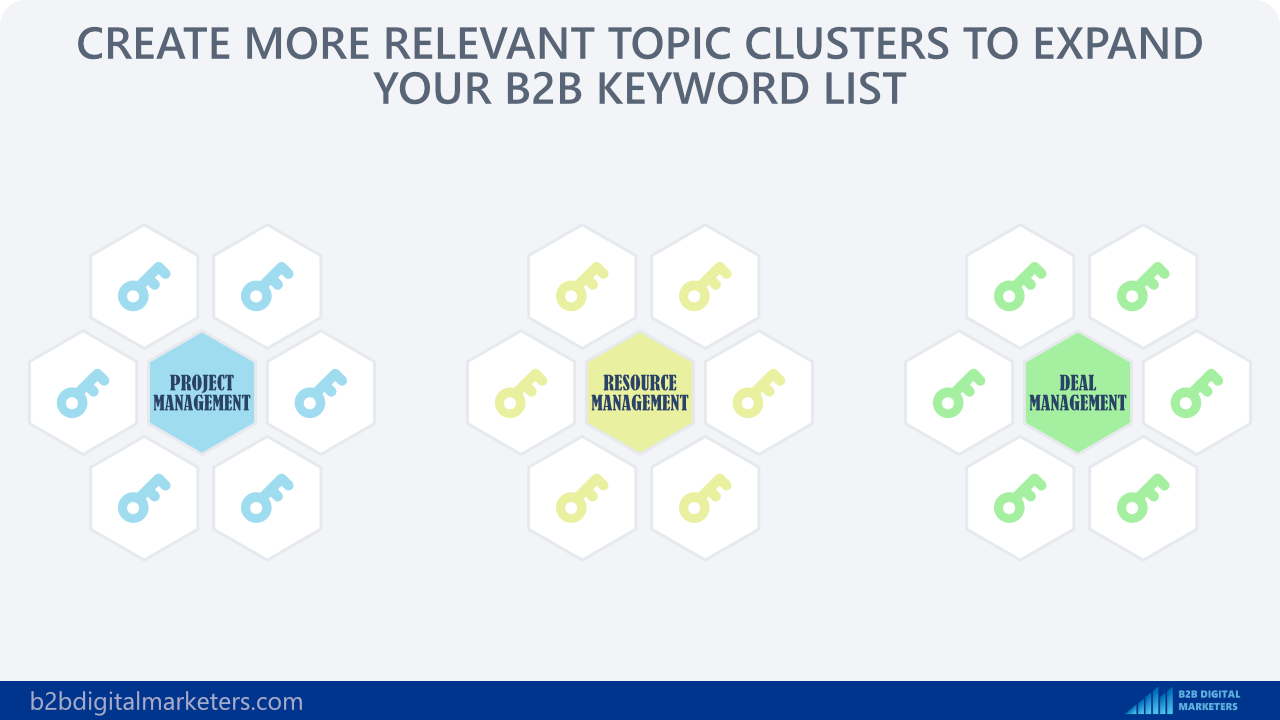
Or if you are a marketing agency offering link building, then another relevant topic cluster could be content marketing or email outreach.
Of course, then content marketing has many other relevant subtopics that could be topic clusters as well such as blogging, email marketing, buyer persona, writing, blog posts, etc.
You can create your topic clusters based on the niche you are in, services you provide, products you sell, features you offer, et cetera.
The key is to start with thinking in terms of topics you want to own in the search.
2. Niche Up from Your Seed Keyword
The next way to expand your B2B keyword list is to niche up from your seed/body keyword.
As shown from the “irish whisky” keyword, you can niche up to the “whisky” keyword.
Or for example, if you are in project management, then you can niche up to the keyword “project” and start generating more B2B keywords.
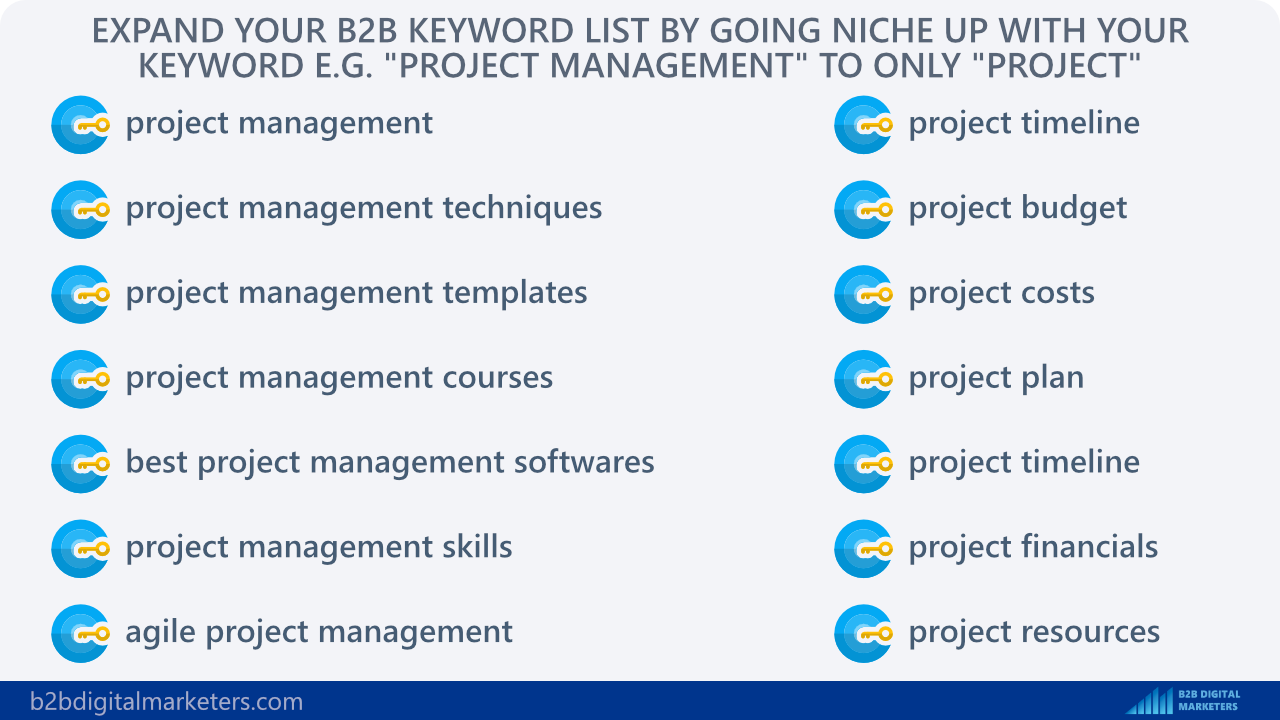
So to do that, you can again use keyword research tools such as SE Ranking to find any related keyword ideas.
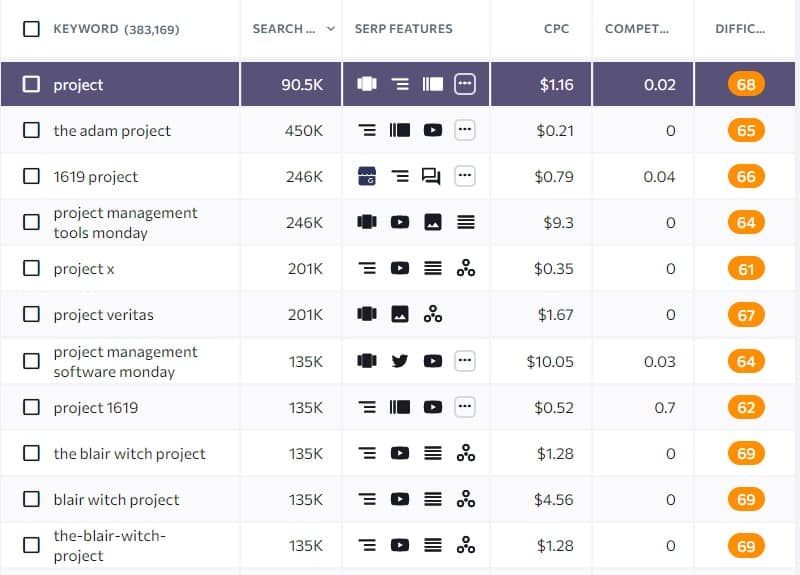
However, be careful, the more generic the keyword becomes, the more you need to filter out unrelated keywords to your niche as generic keywords can have many different meanings.
Such is in project management; you would not really find the keyword “school project” or “the adam project” interesting in terms of revenue or bringing the right B2B audience.
Also, you can use your Google Search Console to search for any relevant keywords. In the queries report you can find keywords you are already ranking for, often some which don’t have a specific piece of content but were just briefly mentioned in another of your content.
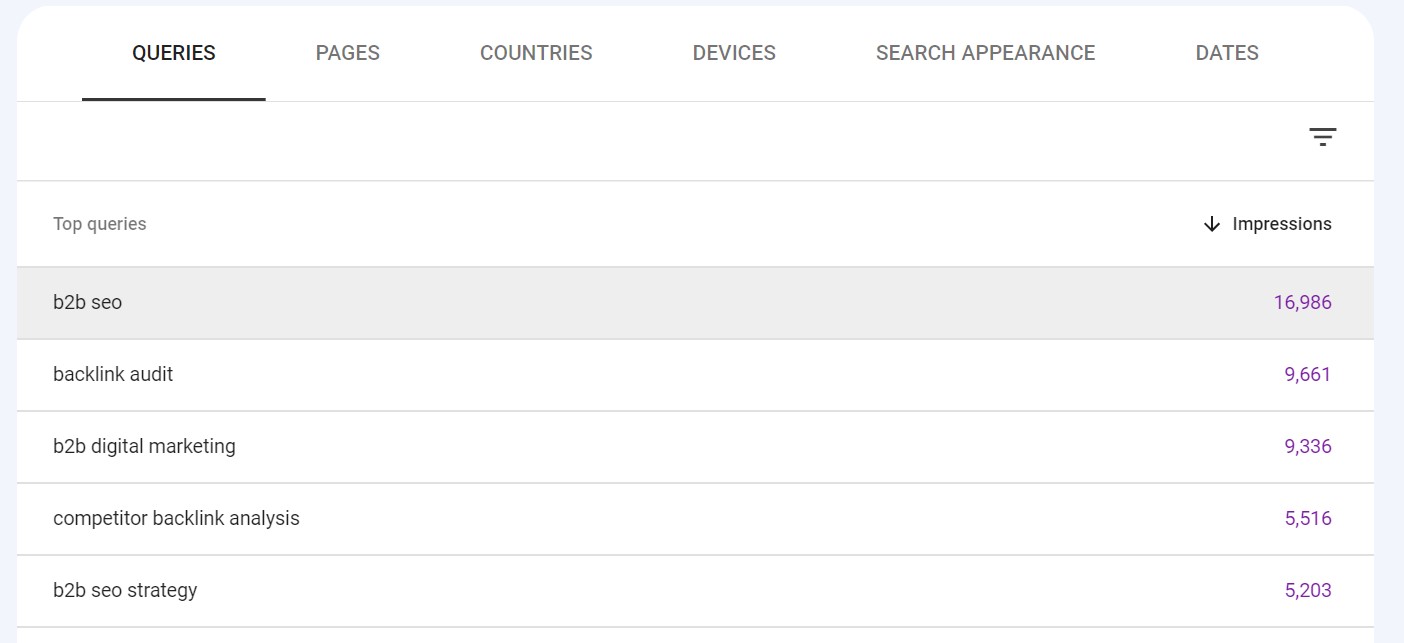
3. Focus on Processes, Techniques, Best Practices, or Strategies
The next way to expand your B2B keyword list is to focus on processes, methodologies, techniques, best practices, strategies, and different types of benefits your product or service is offering.
For example, in project management, the common techniques are work breakdown structure (WBS), critical path method (CPM), scrum, scaled agile framework (SAFe), et cetera. All these are perfect keywords to target and some are topic clusters as well.
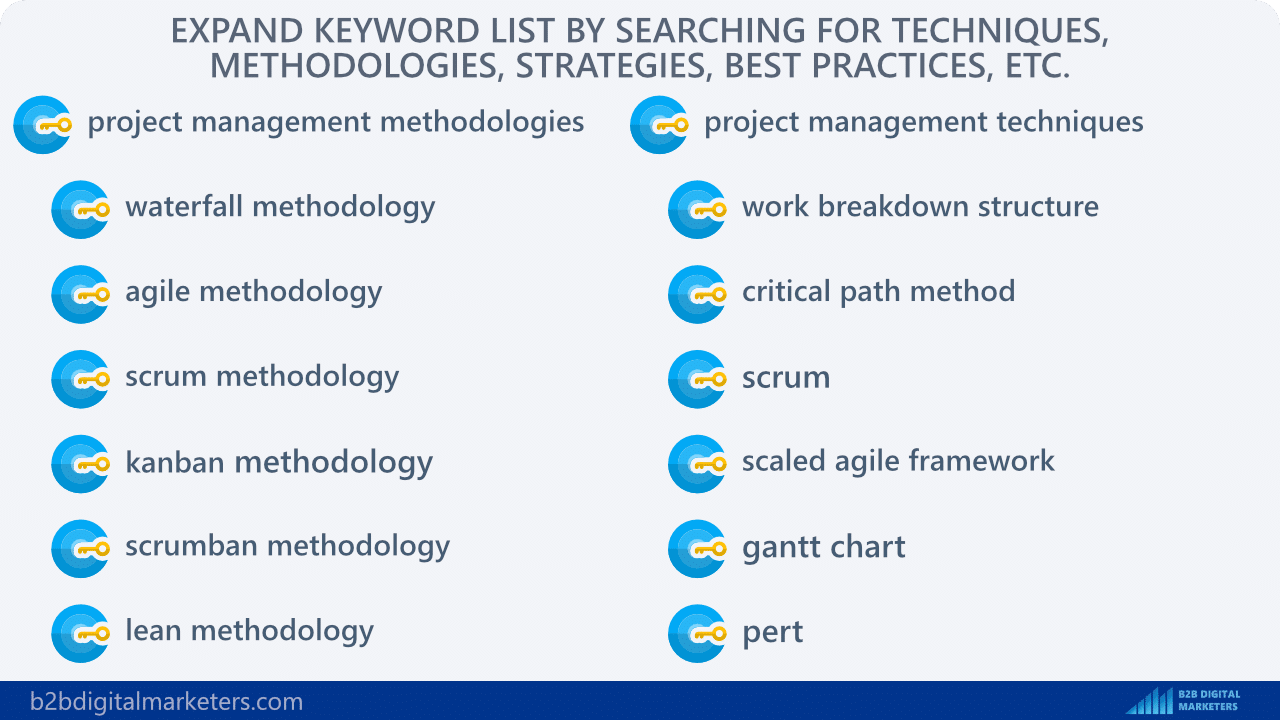
Or in SEO there are so many different techniques, processes, or strategies such as SEO audit, SEO Keyword Mapping, SEO checklist, white hat SEO, on-page SEO, off-page SEO, link building, technical SEO, and many, many more.
And again, you can use a keyword research tool or the best way is to Google your “body keyword + any of the modifiers” and start going through the websites and start collecting more keyword ideas.
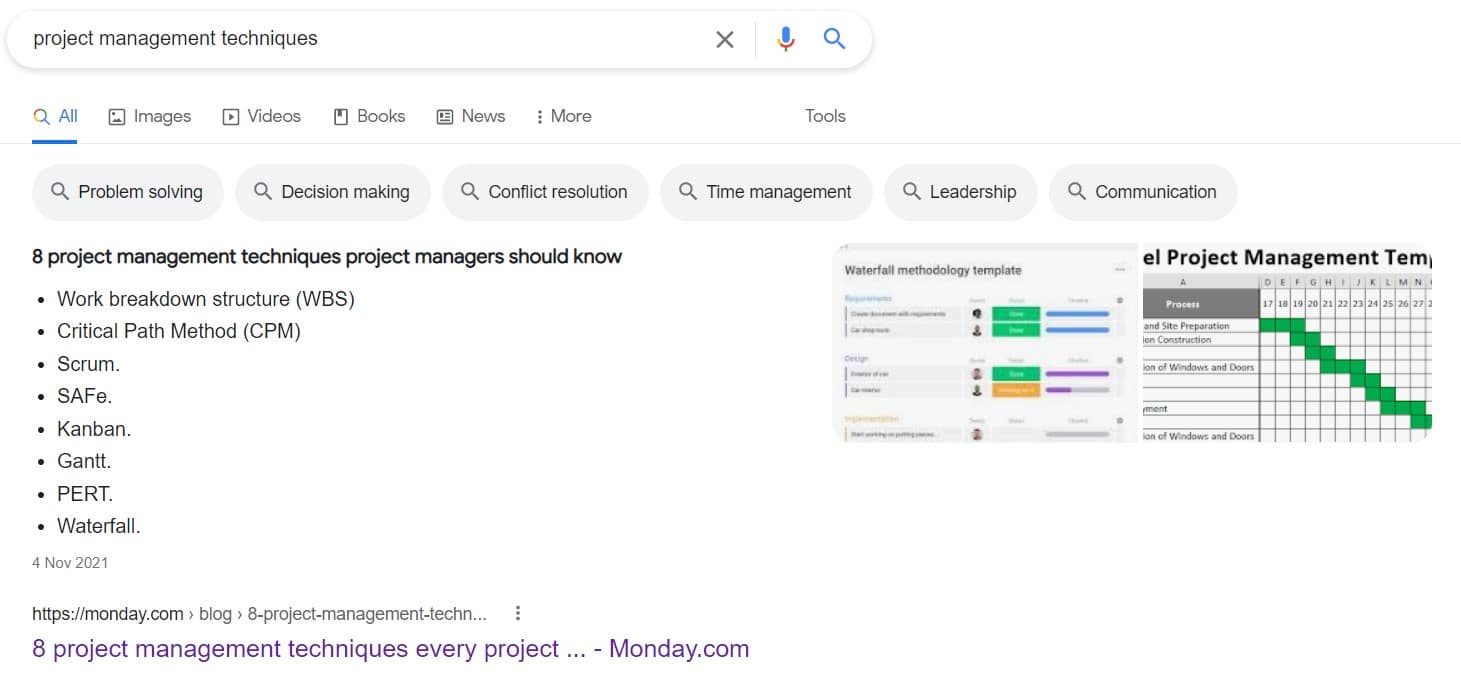
As you can see it can work for anything.
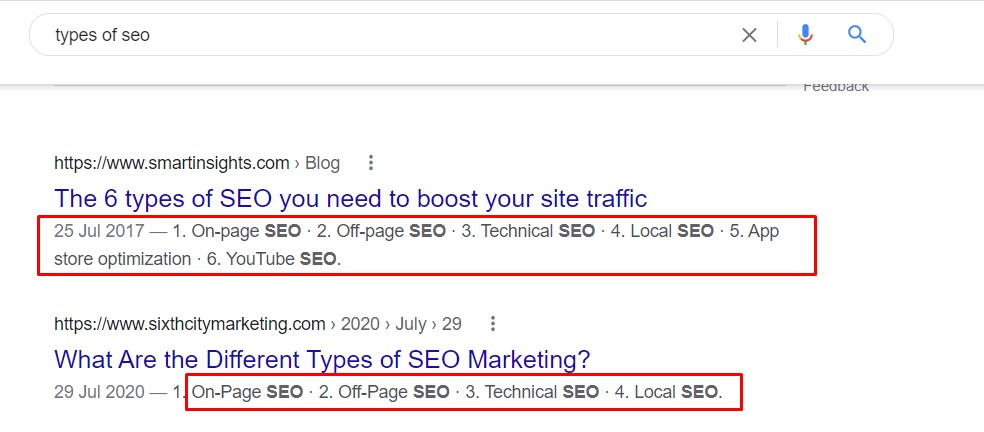
4. Target Industry Terms & Glossaries
Another great keyword research technique to expand your B2B keyword list is to search for industry terms and glossaries and target those as keywords.
There can be hundreds of terms used within your industry.
You should also know that keywords are basically terms or entities, therefore any commonly used term or noun within your industry is most likely a keyword or query that you can target.
Remember, keywords are used by people, so any commonly used term or noun within your industry or niche is a keyword that you can target.
So, to search for industry terms or glossaries, you can use Google again in a similar fashion to the previous technique.
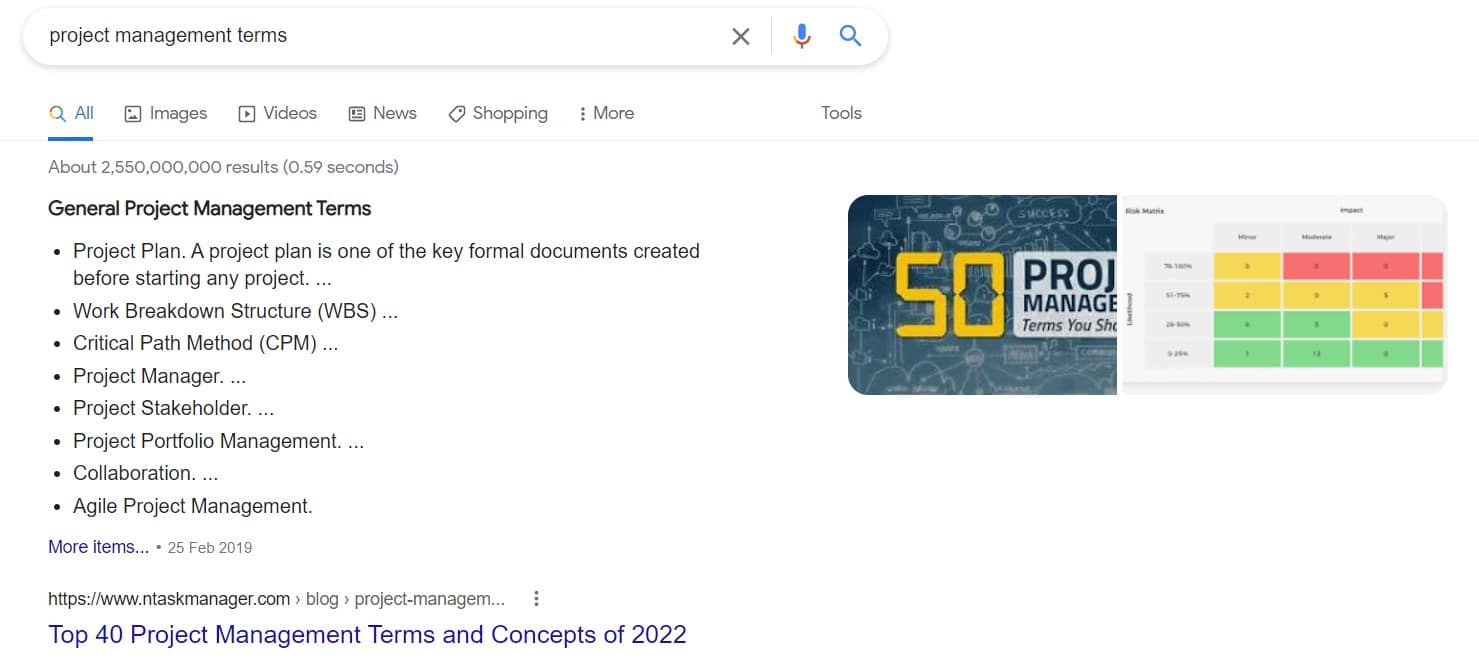
Also, other great sources of keyword ideas are books and eBooks on related subjects. For example, you can go to Amazon Kindle eBooks store and search for your niche or industry ebook.
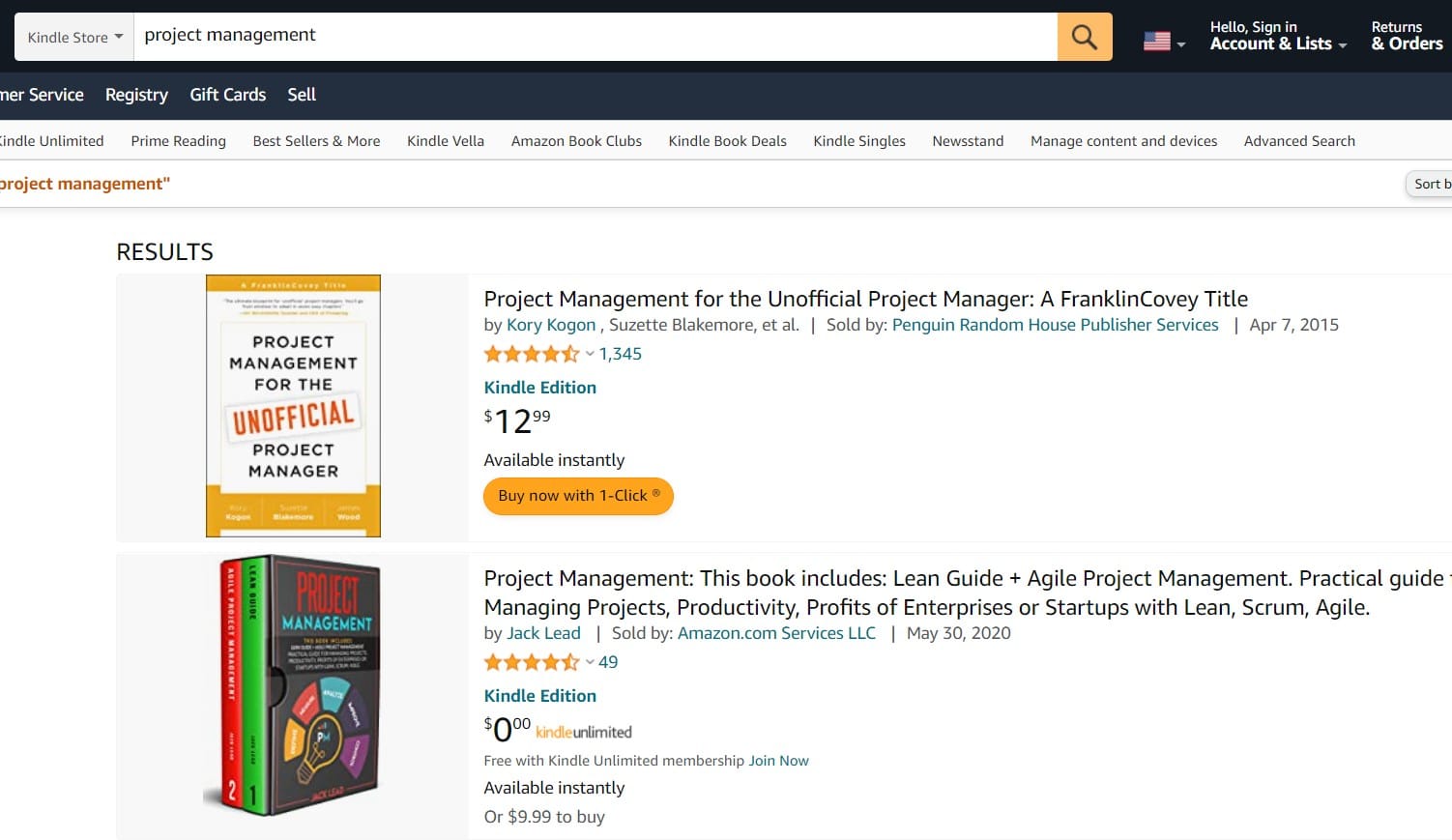
Select one of the ebooks and click on “look inside” or on the cover to open the ebook.
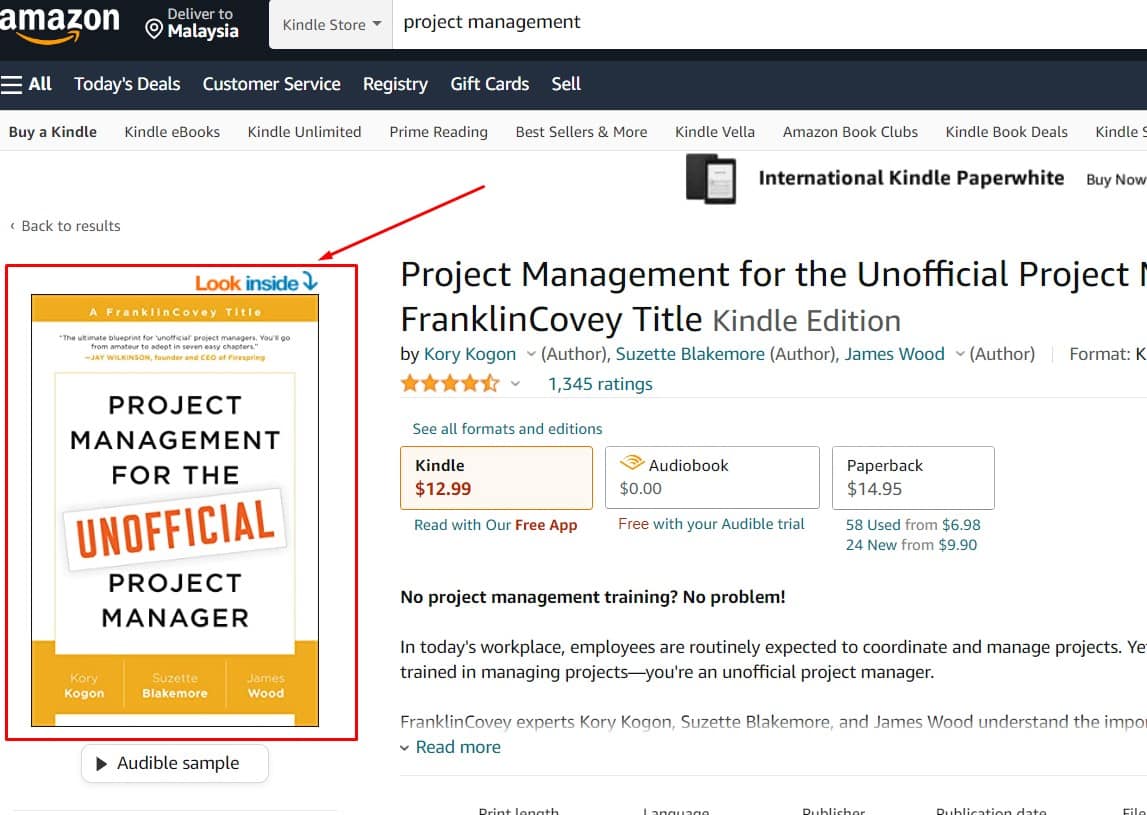
And here you will want to scan the table of contents or skim the book, searching for any common terms or keywords used in project management.
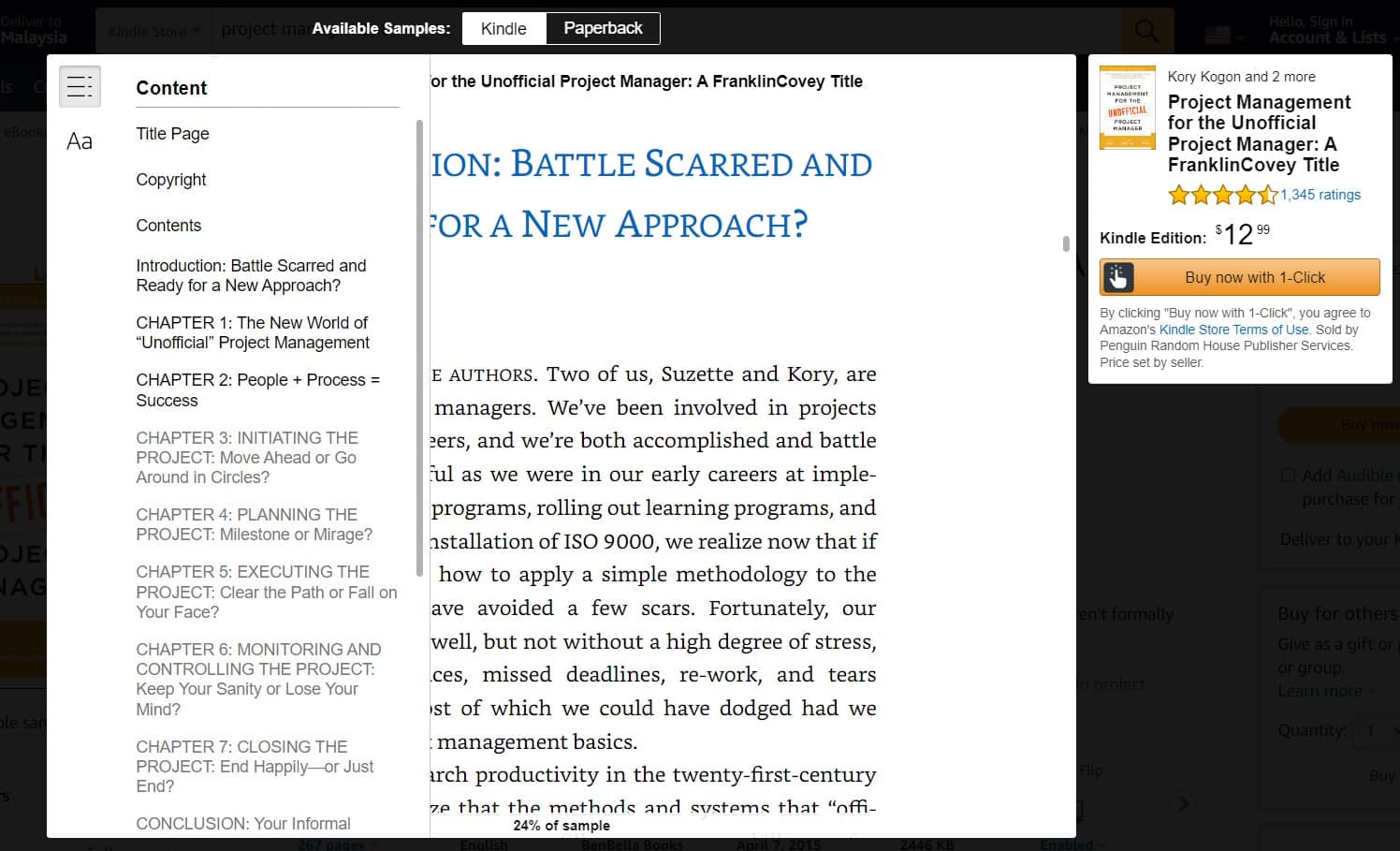
Or even better, buy the book and read it, and every time you find a term, or noun related to your industry, write it down and later use the keyword research tool to check if it exists and has search volume.
5. Analyze Your Competitors’ B2B Keywords.
The next and one of my favorite B2B keyword research techniques is to analyze your competitors’ B2B keywords.
Your competitors can be a great source of ideas and you should definitely check what keywords they are ranking for to get some inspiration.
With that, here are my two favorite ways to analyze your competitors’ B2B keywords.
Method #1: Run Competitive Research Tool
Open a Competitive Research tool such as SE Ranking, enter your close competitor domain, select your target location, and hit “Analyze”.
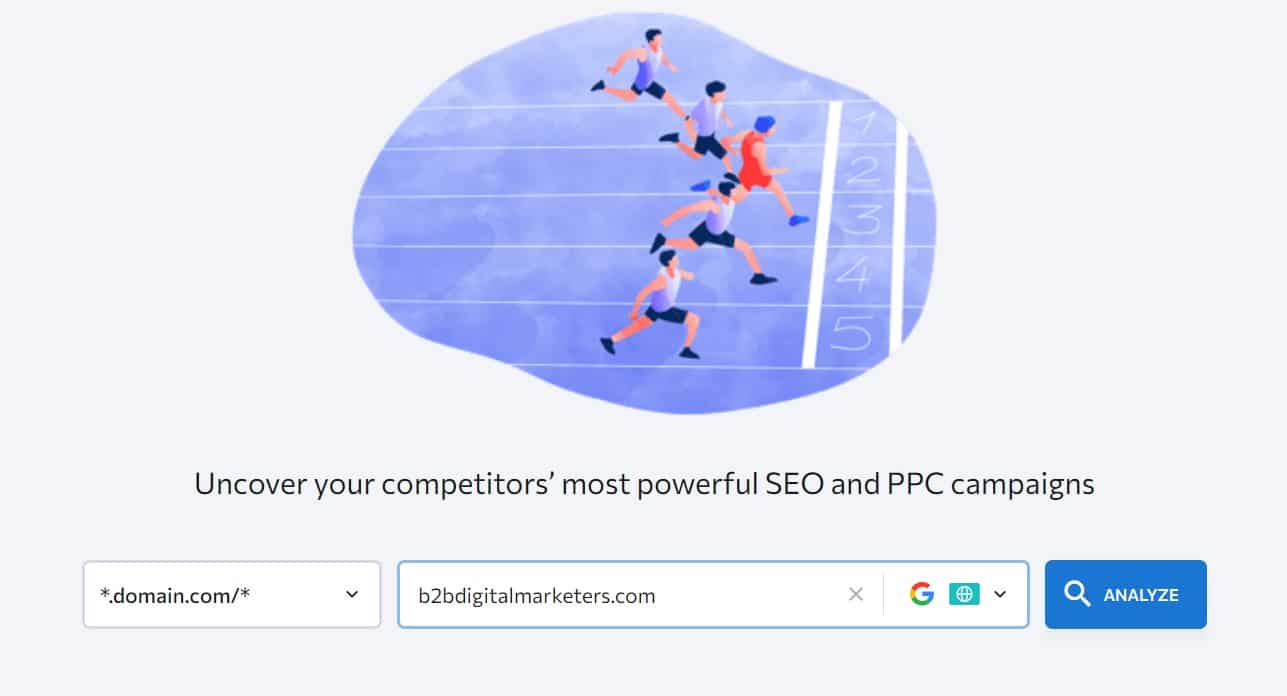
Here you will get a high-level overview of your competitor domain such as the organic traffic, website authority called domain trust, and the ranking organic keywords. So, I click on the number of organic keywords.
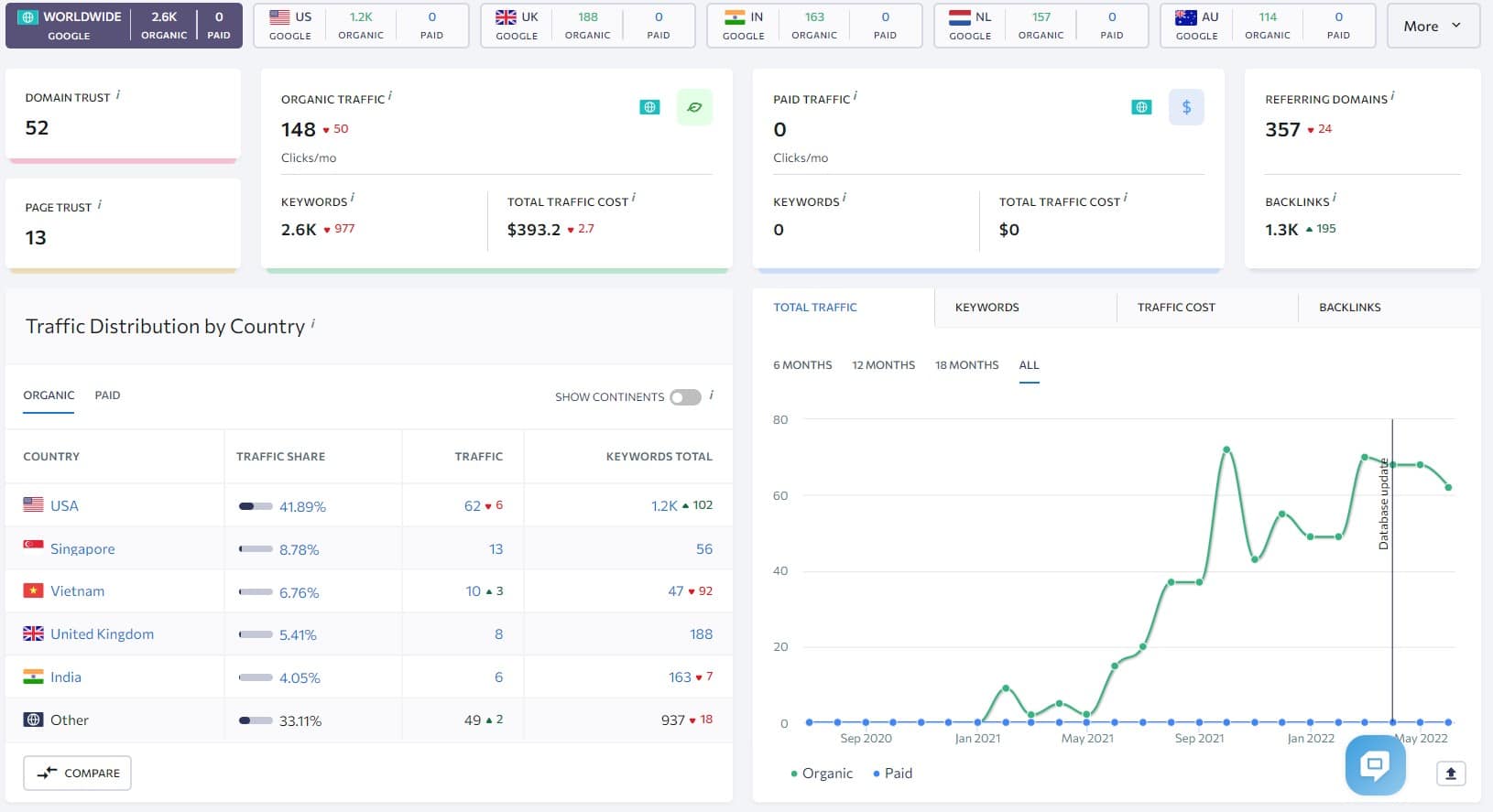
And here you will get all the ranking keywords your competitor is ranking for with additional helpful information. So now you only need to scan the list to find any relevant B2B keyword ideas for your business.
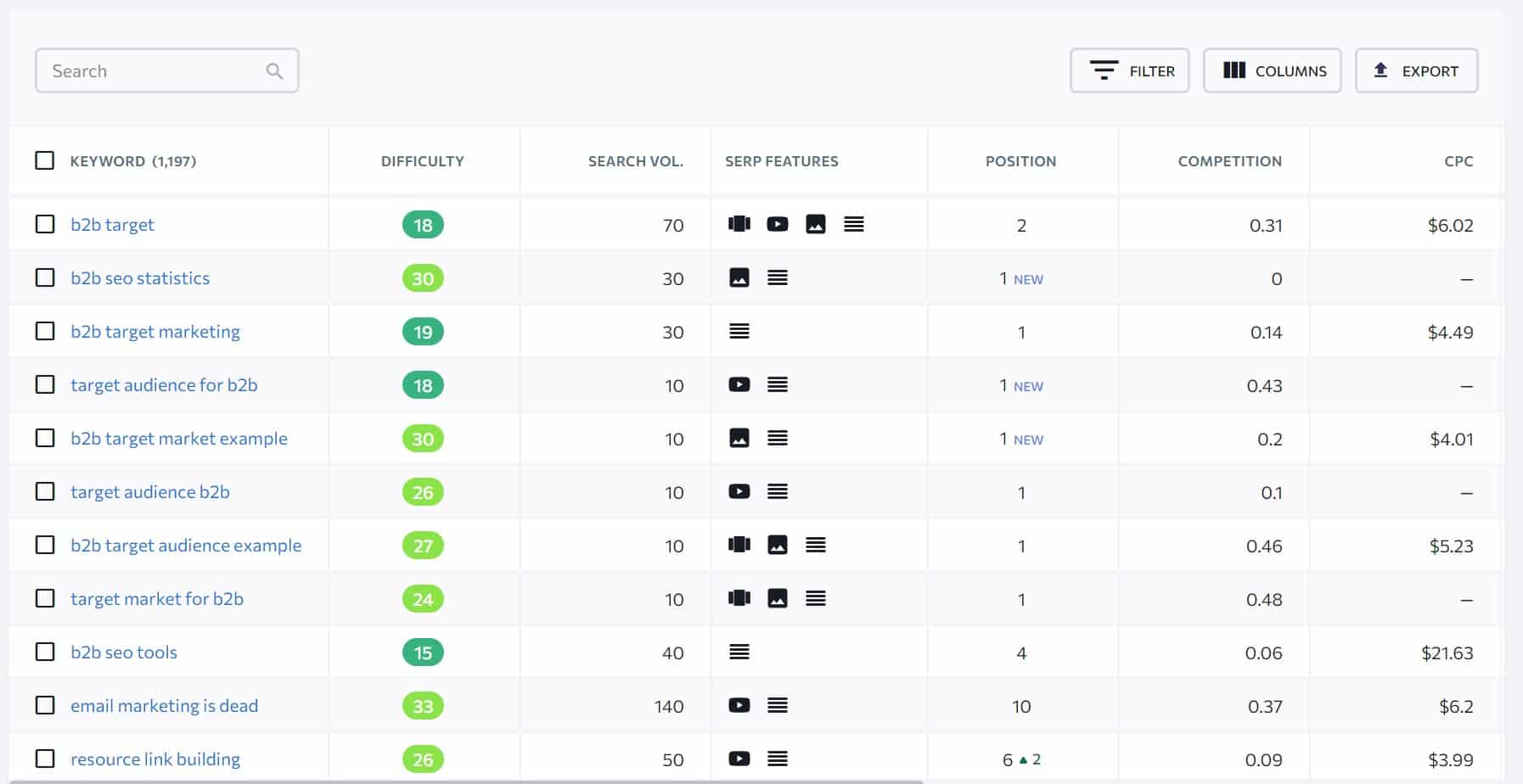
Method #2: Competitor Comparison
Analyze your website with SE Ranking Competitive Research Tool and select the “competitor comparison” feature. Here you will want to enter one or two of your close competitors and click on “Show Results”.

And then you will want to select the “missing” keyword report and select your domain in the bar. Which gives you all the missing keywords your competitors are ranking for, but you don’t along with the ranking pages, search volume, keyword difficulty, and other useful information.
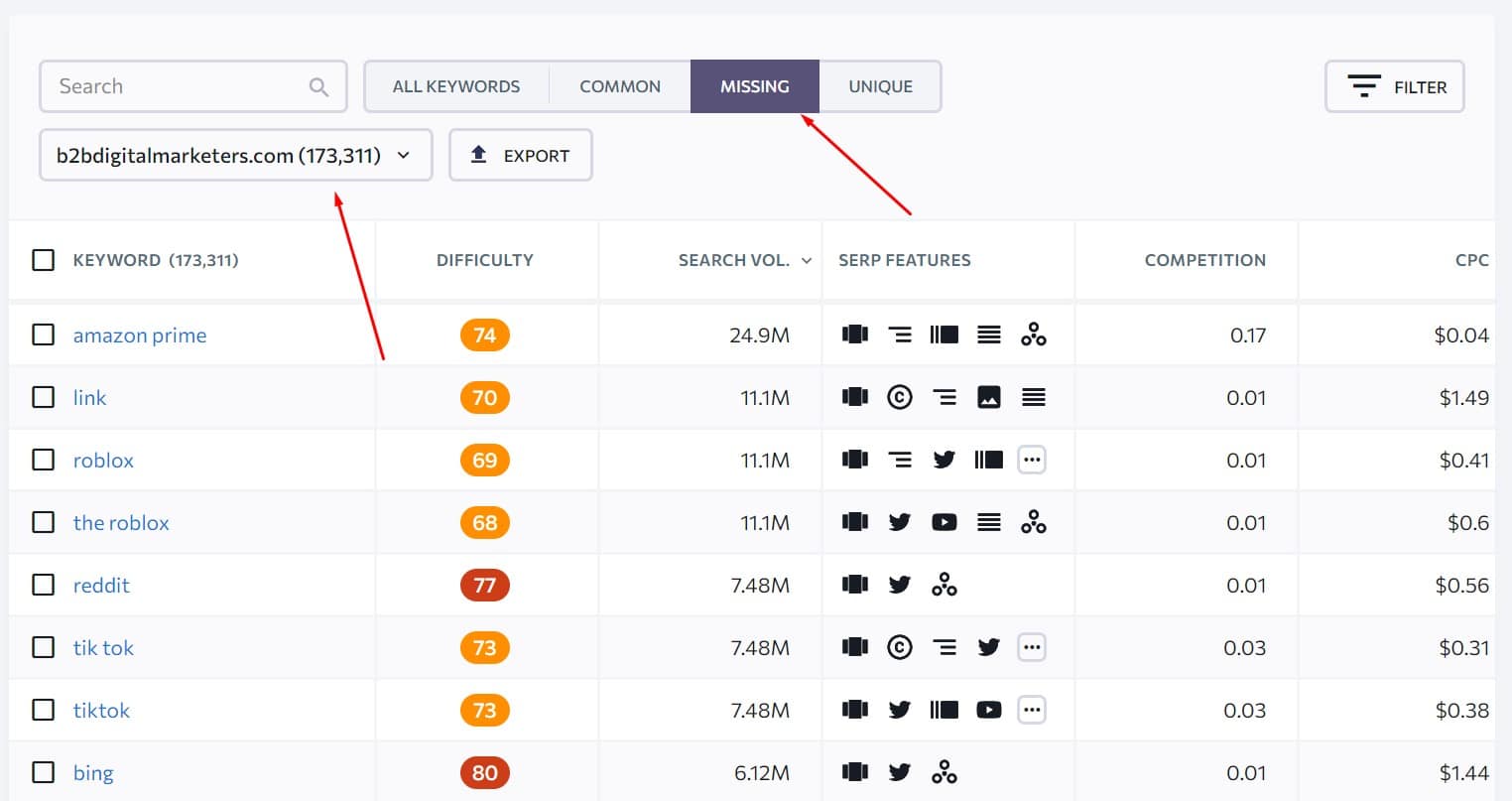
Or you can select the “unique” tab and select your competitor domain which additionally will give you the ranking position for the keyword and the ranking URL.
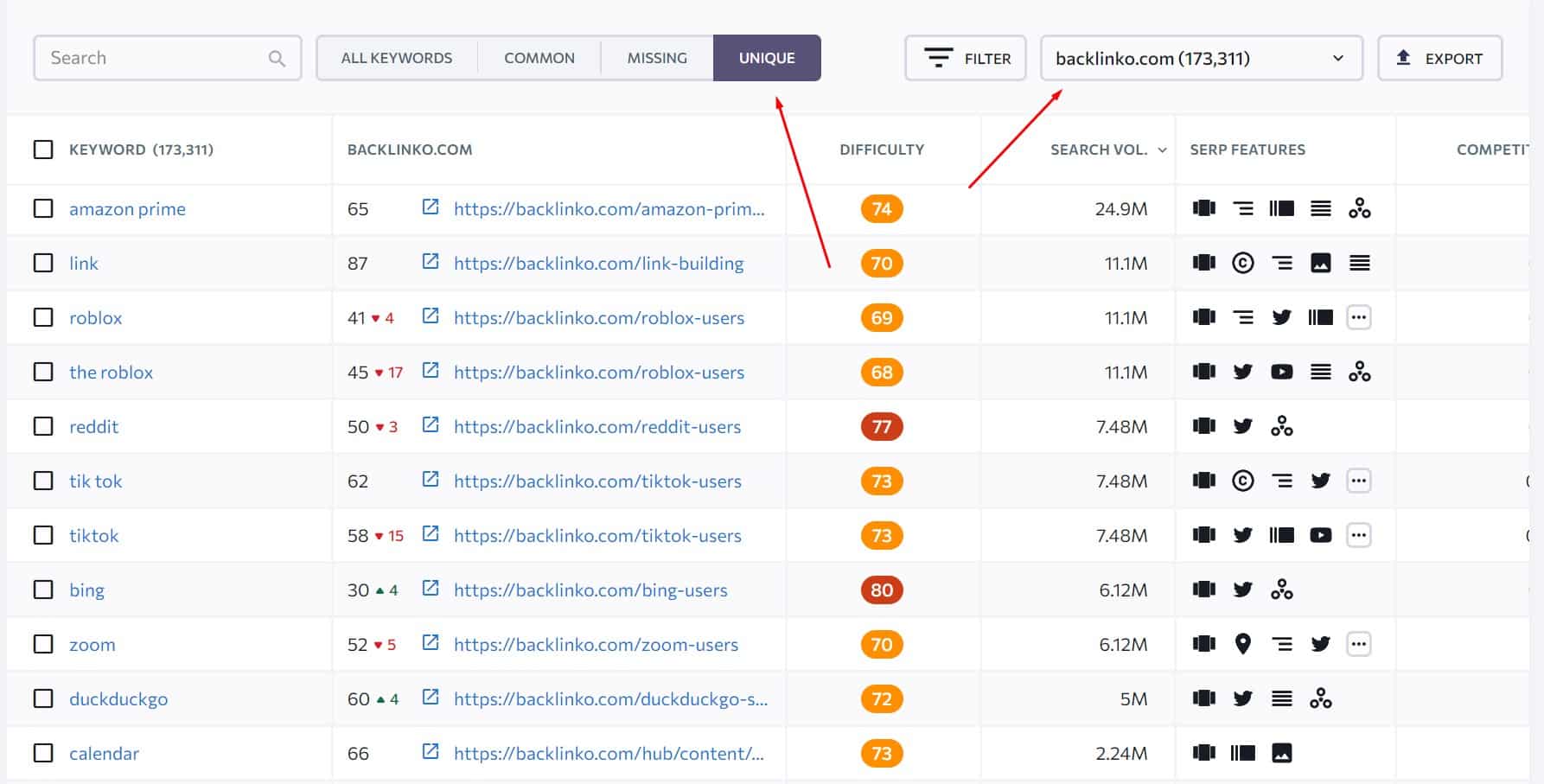
Also, if you do not know which are your close competitors, you can go to the “Competitors” report which will give you a list of close competitors based on your ranking keywords.
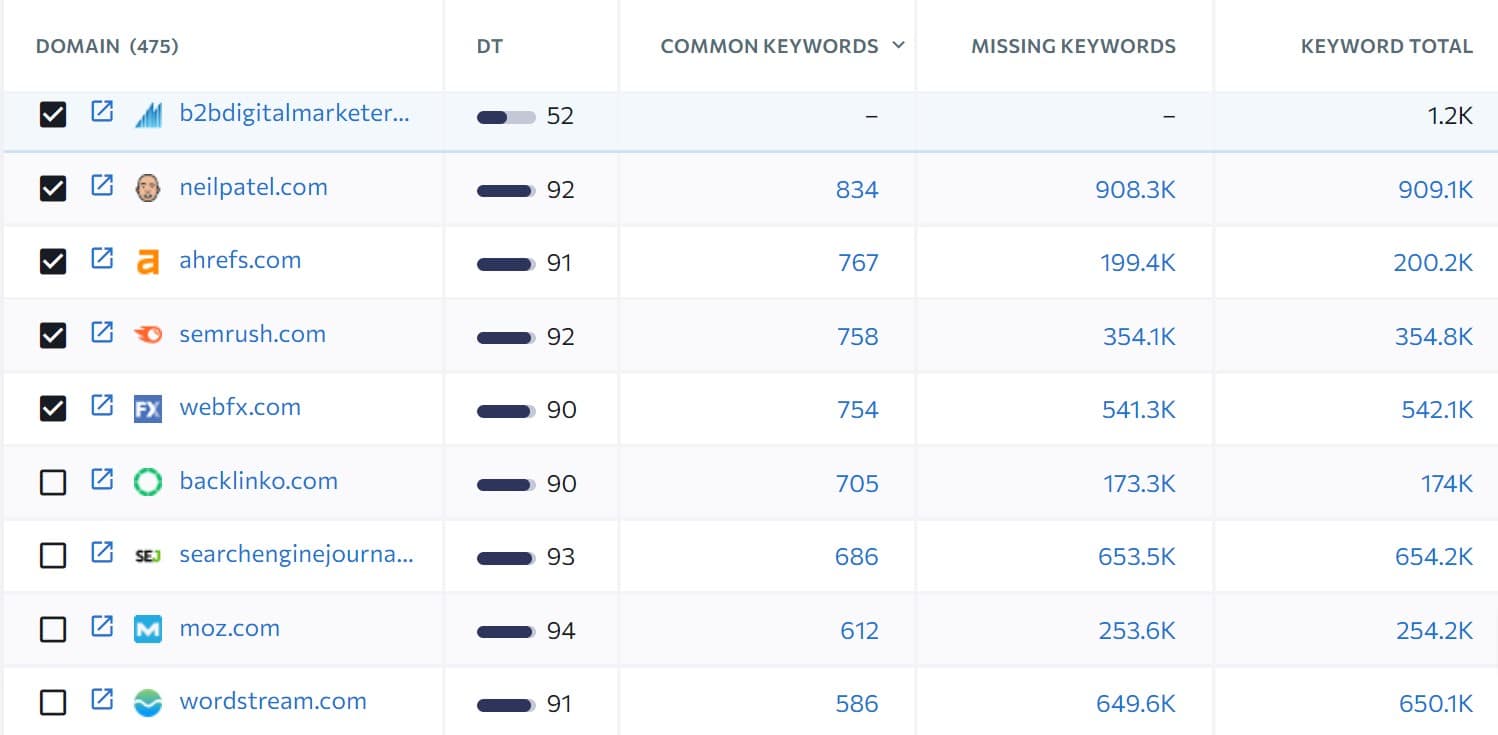
6. Search for Question Keywords
Another B2B Keyword Research method to expand your B2B keyword list is to search for question-based keywords.
And the best way to find such keywords is to look at the “people also ask” box which can give you tens or even hundreds of ideas for your next content.
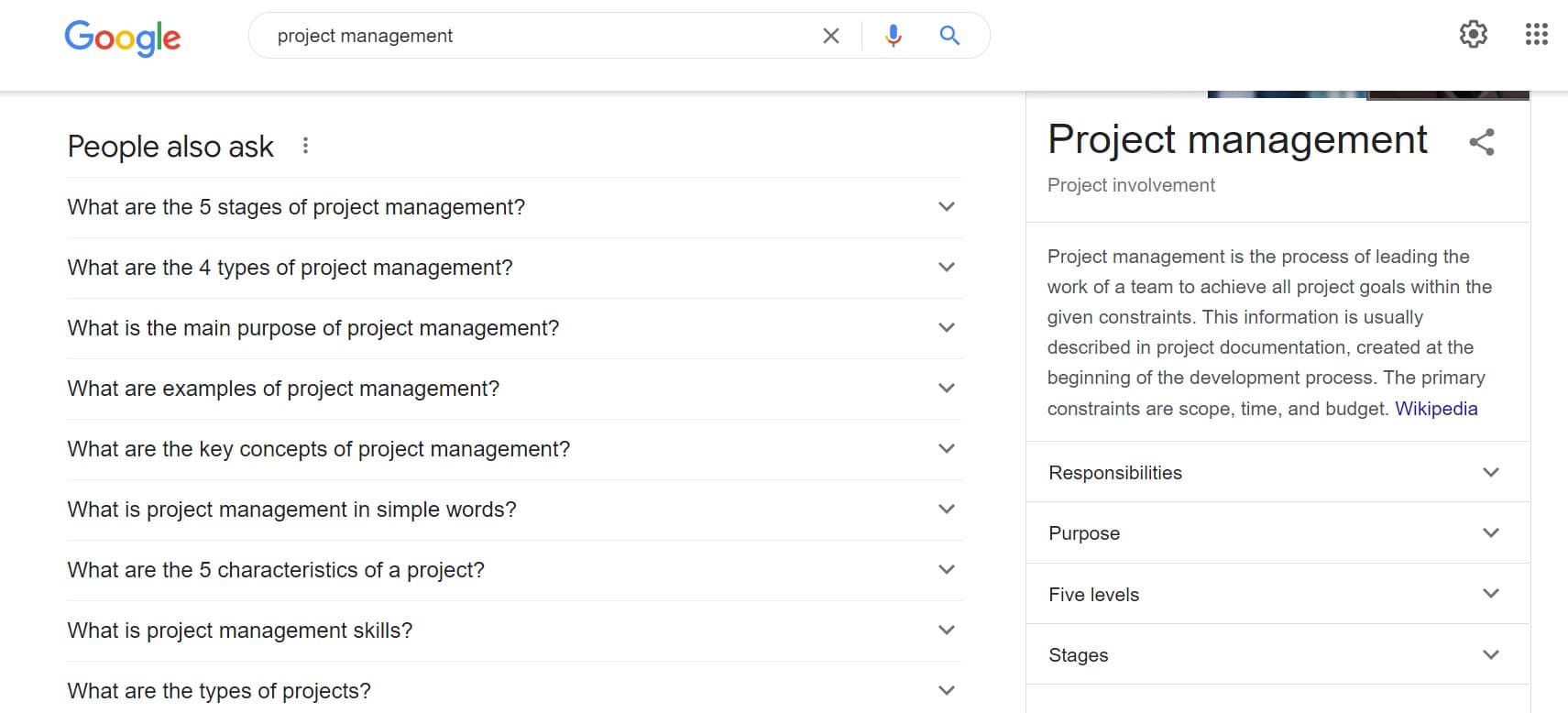
Or you can use the Answer The Public to get some excellent question-based keyword ideas for your B2B keyword list.
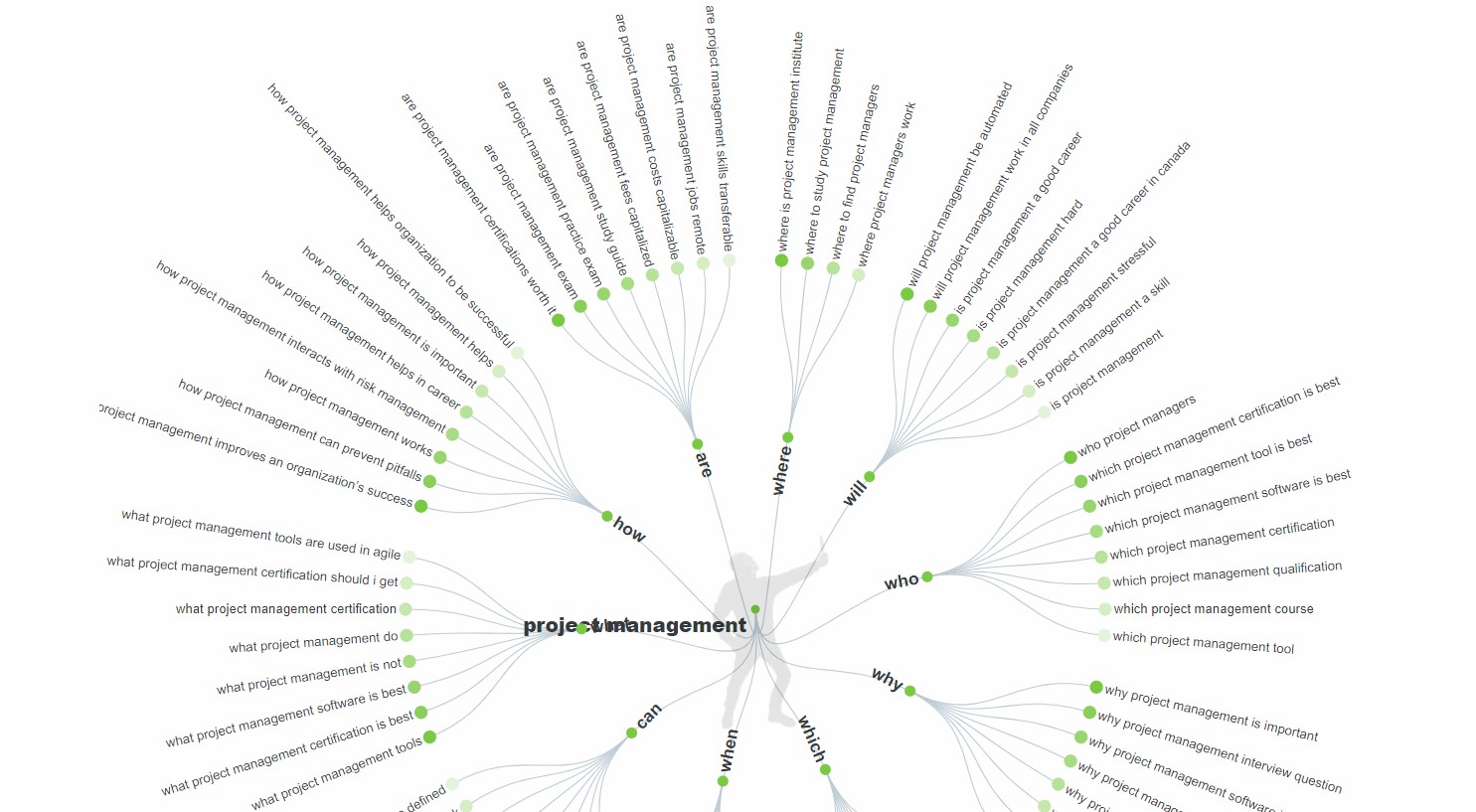
7. Add Keyword Modifiers
Another great way to expand your B2B keyword list is to use keyword modifiers for your existing B2B keywords.
Using keyword modifiers can give you instantly a ton of great keyword ideas to grow your organic traffic and SEO lead generation.
Keyword modifiers help you to target a B2B audience with specific needs by adding different adjectives in front or behind your keyword.

Now, what keyword modifiers to add to your product or service purely depends on your business. For example, in manufacturing, the usual keyword modifiers can be location or material type while in SaaS it is usually industry, location, price, or technology.
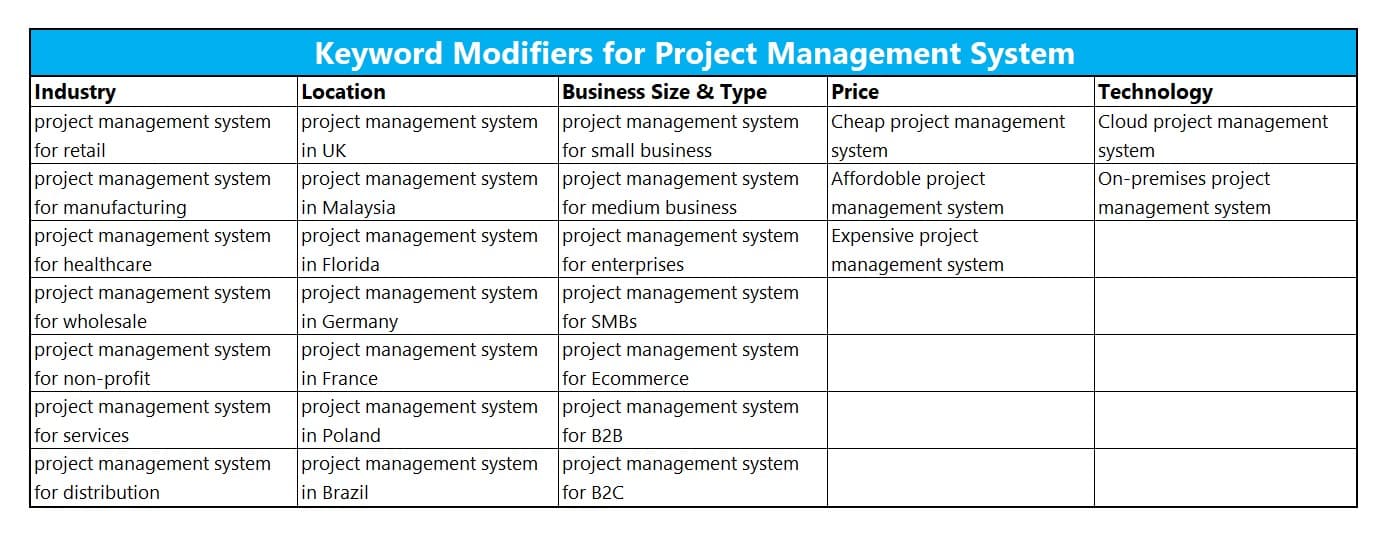
And of course, every time you create a keyword by adding a keyword modifier, ensure you run it through a keyword research tool, to ensure it has any search potential and you have the right keyword variant.
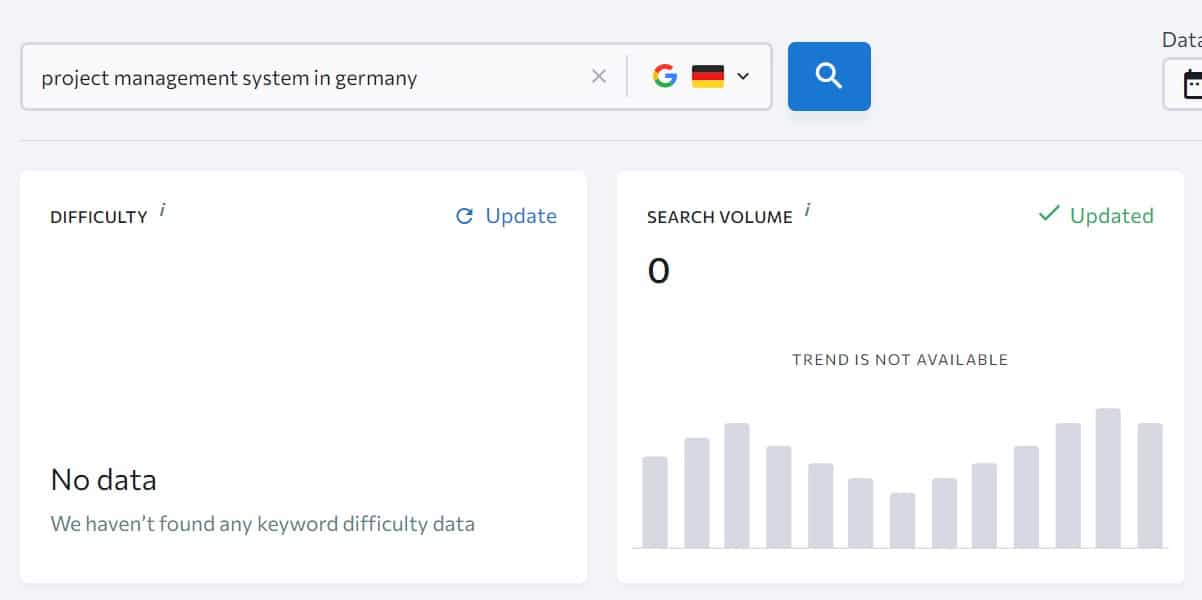
8. Leverage Sales & Customer Insights
And lastly, you can leverage your sales & customer service insights.
Ask your sales or customer service what the top questions and objections are your customers are having, what are the features or benefits they are looking for, what are the common pain points and needs, what industries convert the best and other useful insights will help you to get more keyword ideas and topics you should target.
Step #6: Target B2B SEO Keywords Used by Your B2B Target Audience
The next step of B2B keyword research is to target B2B keywords commonly used by your B2B target audience to increase brand awareness.
According to research, on average, it takes 5 to 7 impressions for people to remember your brand. Thus, getting your brand consistently in front of your b2b target audience improves brand recognition and trust and with that generates more sales for your business as 46 percent of consumers say that they would pay more to purchase from brands they can trust.
That’s why targeting B2B SEO keywords commonly used by your B2B target audience can greatly improve your brand awareness, lead generation, and sales.
For example, HubSpot is doing a great job at targeting keywords their target audience is commonly searching for.
HubSpot offers CRM software for sales, marketing, and customer service, so obviously, their B2B target audience is people in sales, marketing, and customer service departments or even business owners interested in sales, marketing, or customer service activities.
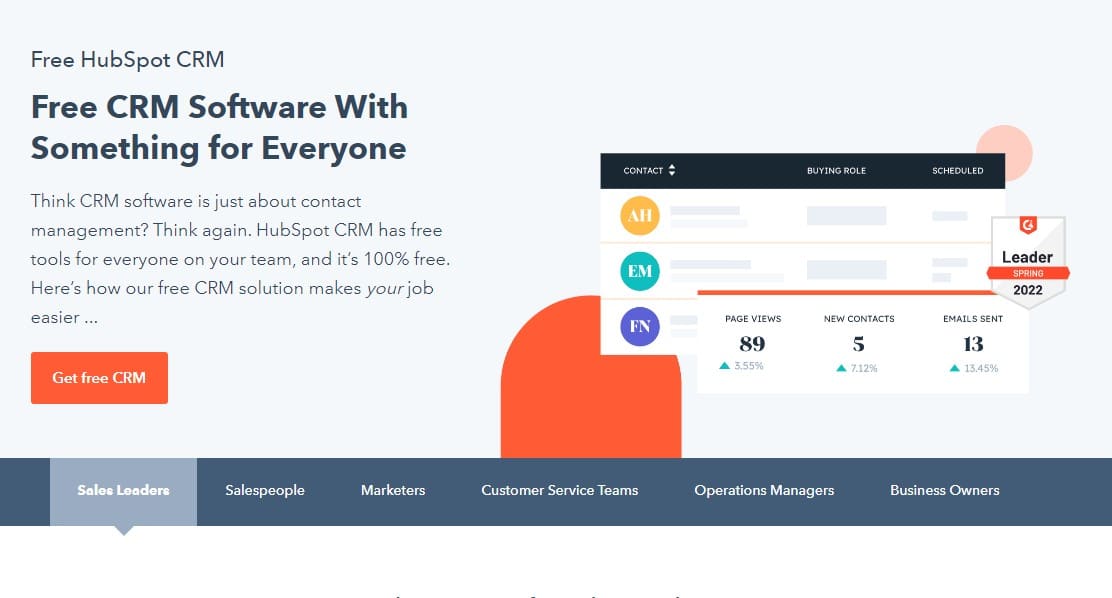
So, what HubSpot does is targeting all the keywords related to sales, marketing, and customer service including those that have nothing to do with their CRM software such as SEO, keywords, social media marketing, and others.
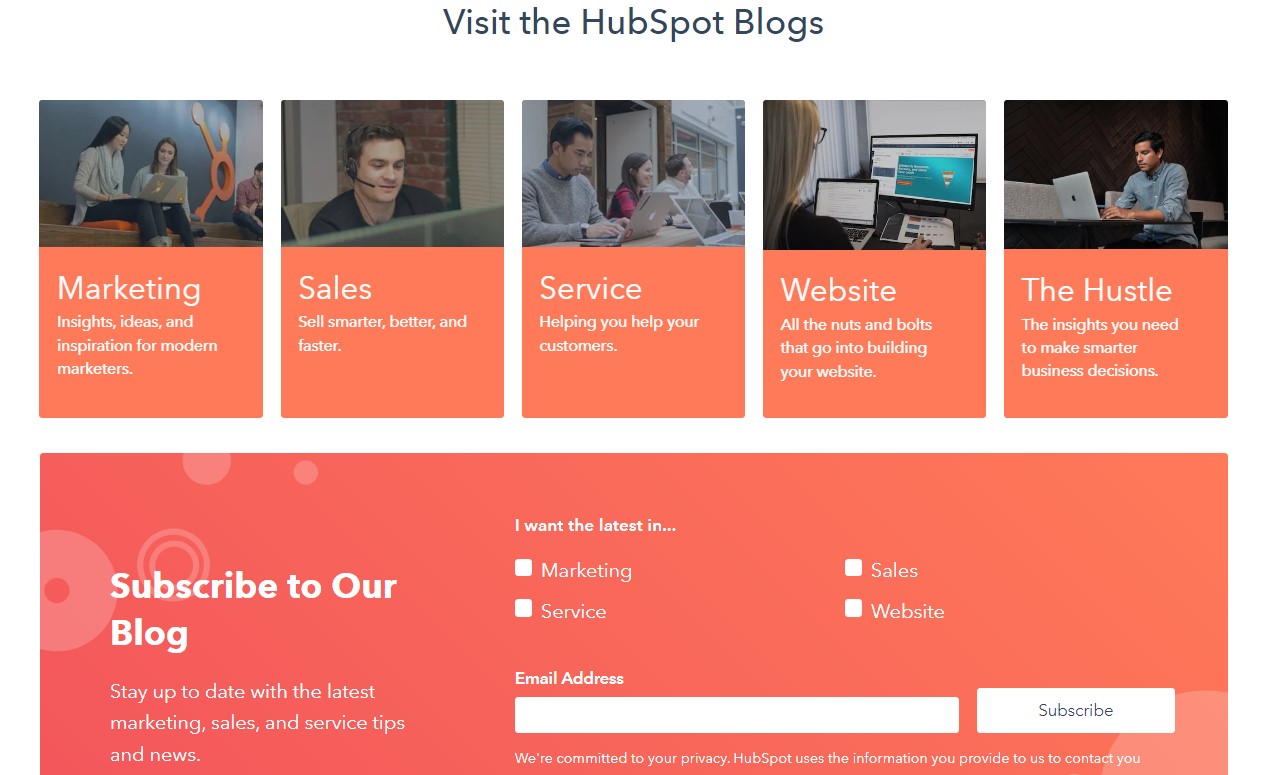
And thanks to this, they are able to drive massive brand awareness for their products and show them to millions of potential customers because soon or later every sales, marketing, customer service person, and business owner will need CRM software.
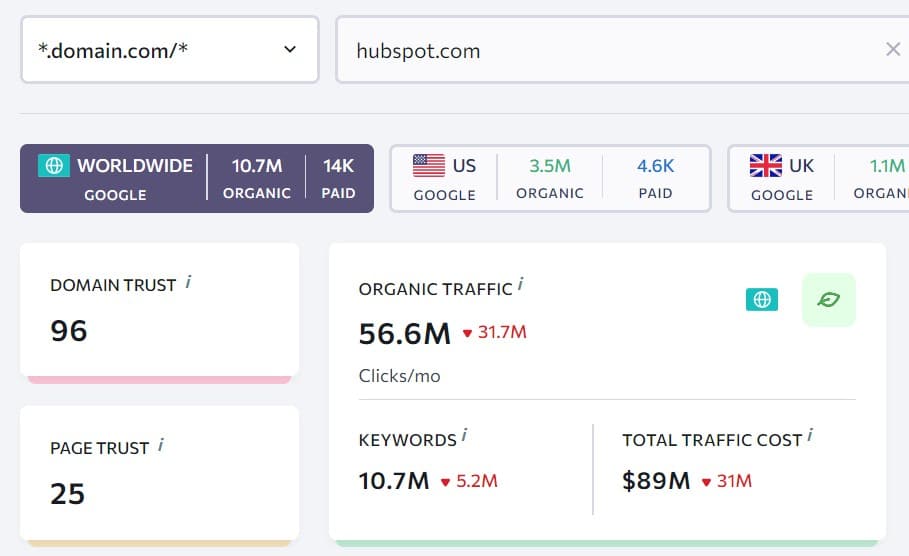
And previous exposure to their brand can greatly increase trust, improve conversion rate, and speed up the sales cycle.
In fact, 61% of people are more likely to buy from companies that deliver unique content.
And another example could be if you are selling a project management system, then you would be targeting every single keyword that is commonly searched by people in the project management department.
Or if you are selling certain law services, then you can target keywords that lawyers are using.
However, things get a bit more complicated with local brands. For example, if you are selling office cleaning services in Washington and your B2B target audience is from the HR department in companies located in Washington, you can still target B2B keywords HRs are using.
However, you should focus more on local keywords used by HR, such as what are the hiring laws in D.C, the average salary in D.C, or any keywords used specifically by local HRs.
Other than that, targeting B2B keywords used by your B2B target audience is definitely one of the most powerful and still quite underutilized B2B keyword research techniques.
Step #7: Focus on Google Ads Keywords
The next step of your B2B keyword research is to focus on your Google Ads keywords if you are running Google Ads.
First of all, Marketers using both organic SEO techniques and pay-per-click ads see an average of 25% more clicks and 27% more profits compared to using a single technique.
With that, if you are running Google Ads, you can get a nice list of highly relevant profitable keywords for your company, as they continue trying to search for new keywords that you can add to your campaign.
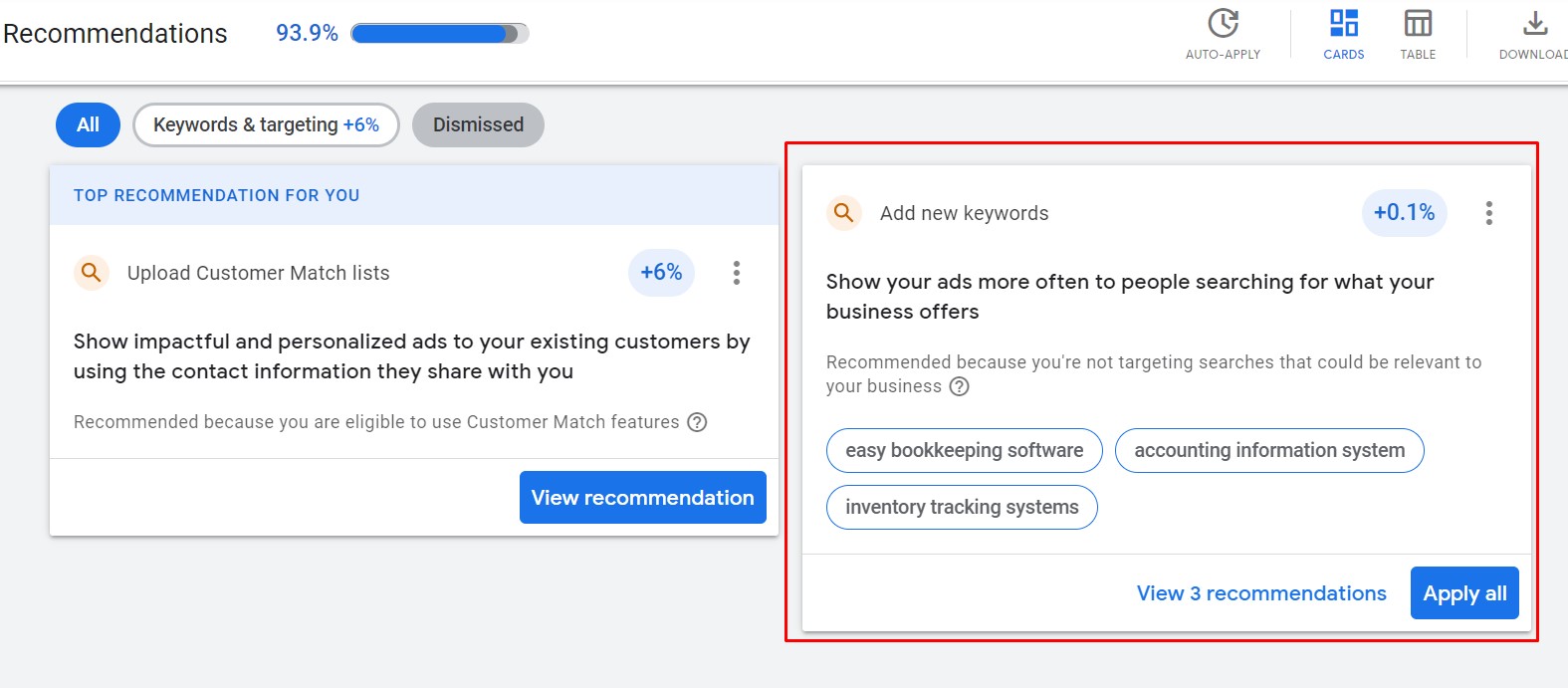
Or you can go to the “Search Terms” report to see all the terms your ads appear for and pick from that to increase your B2B keyword list.
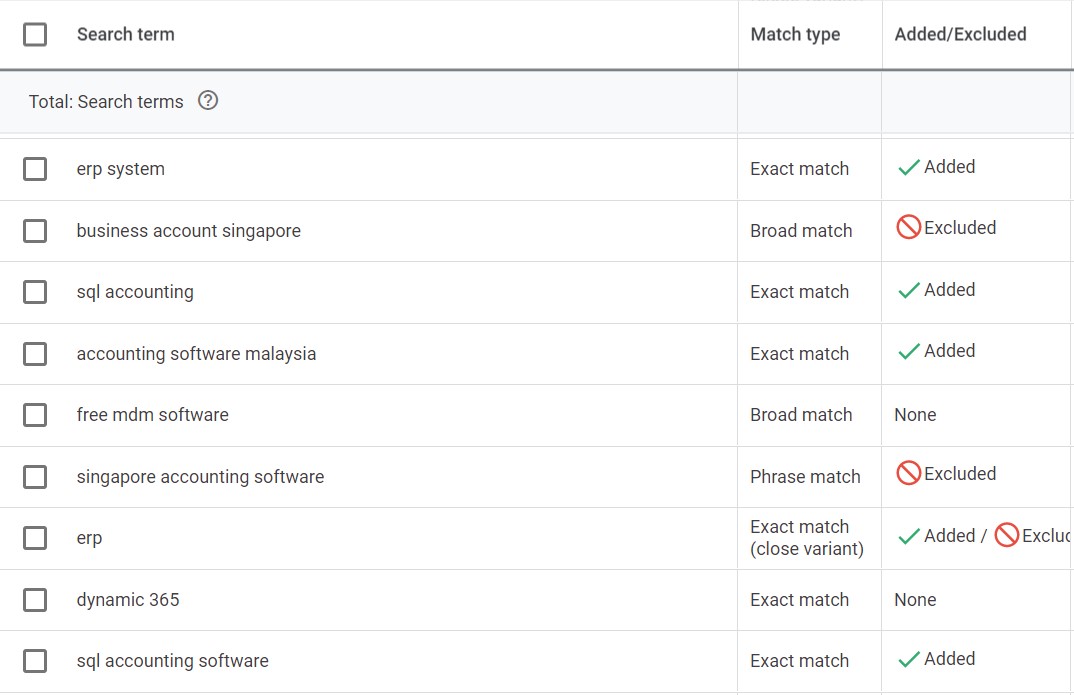
Also, Google Ads is the fastest way to test out if the keywords you want to target are going to be profitable for your business.
For example, if you want to see if your newly discovered topic cluster makes sense, just pick the profitable keywords with commercial or transactional search intent from your topic cluster and run it with ads.
And if it generates profit, then it’s a good topic cluster to go after.
If You Are Not Using Google Ads
If you are not using Google Ads, you can still benefit from it.
You just need to find keywords, your competitors are bidding on because if they are paying money for that keyword, it can be safely assumed it brings them ROI.
To find these keywords, just analyze your competitor that is running Google Ads with SE Ranking Competitive Research tool and go to the “Ads History” report.
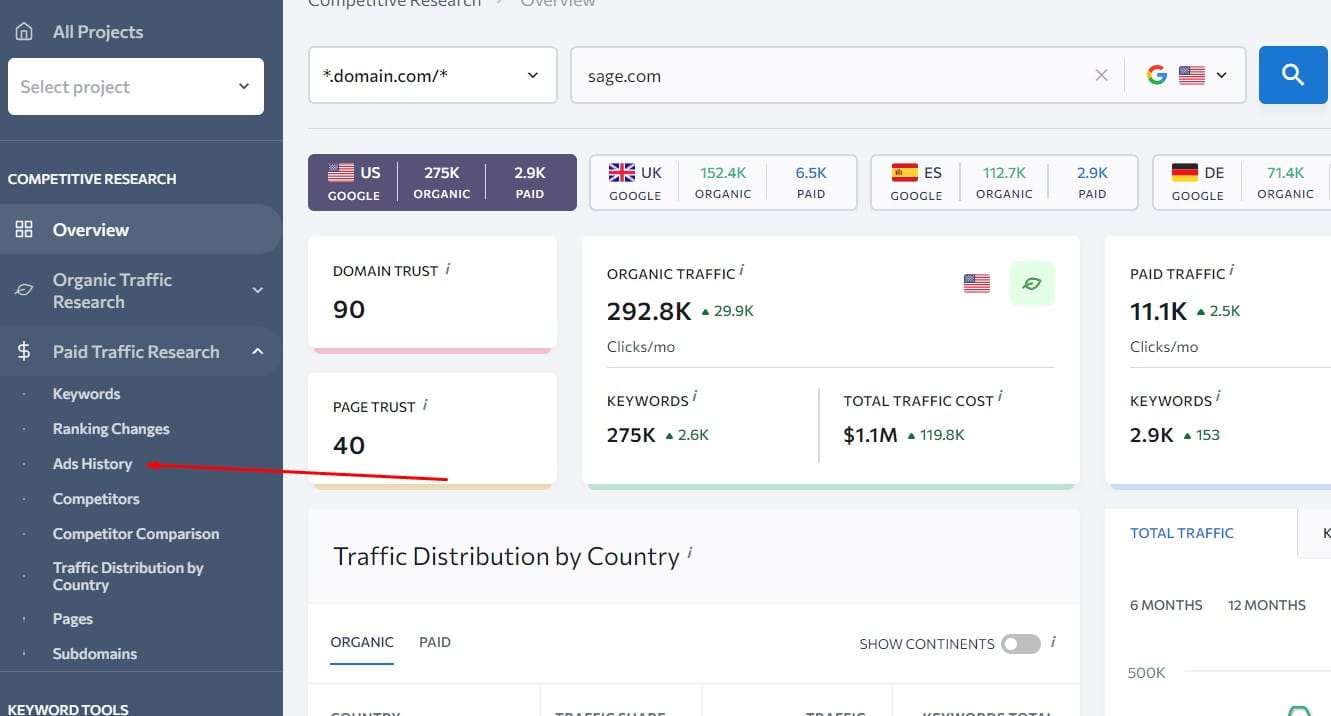
And here you will want to sort the keywords by Ad Count from highest to lowest to see keywords that they have been continuously bidding on as they are proven to generate profit for a company.
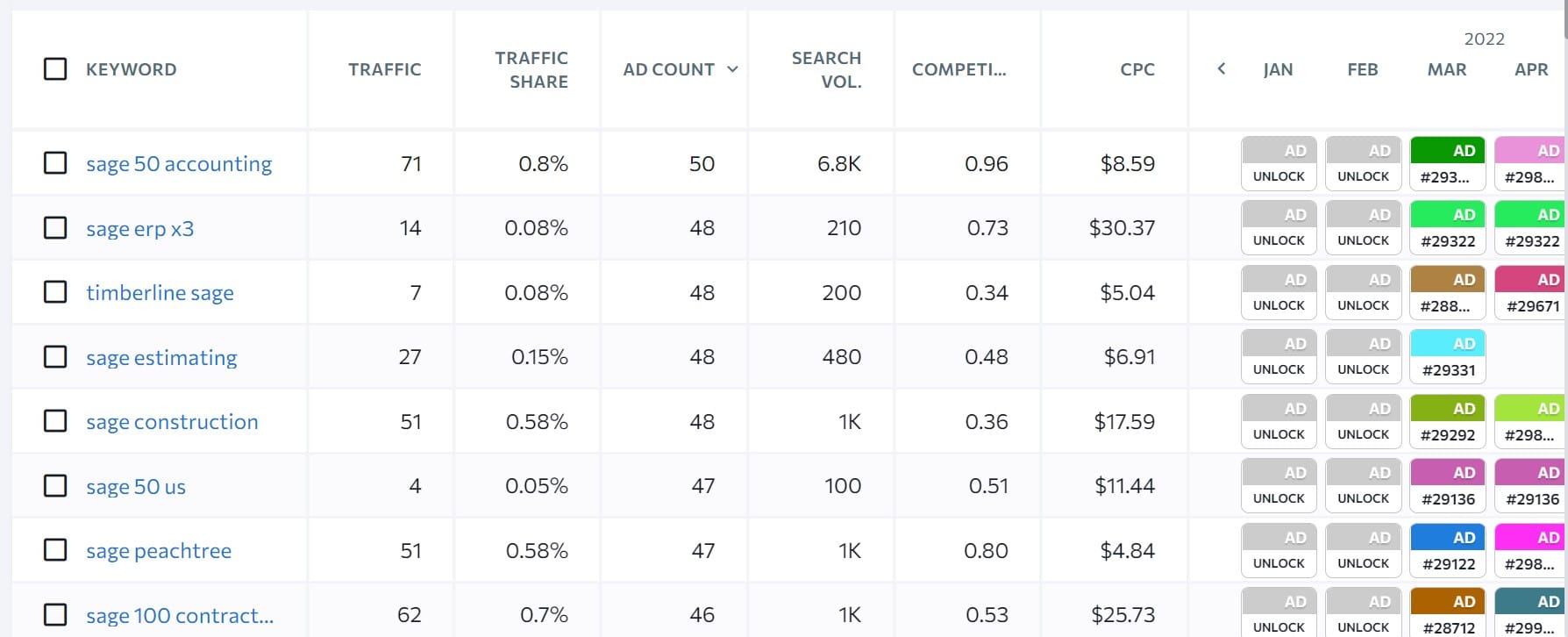
And here you have another great source of B2B keywords.
Step #8: Keyword Prioritization with Keyword Value Matrix
The next and last step of this B2B keyword research process is to prioritize the B2B keywords you have just collected from your B2B keyword research. If you have done a great job, you should have at least a couple of hundreds or even thousands of solid keywords for your website.
So now, you need to decide which keywords to target first. To do that, you need to organize your keywords into a keyword value matrix:
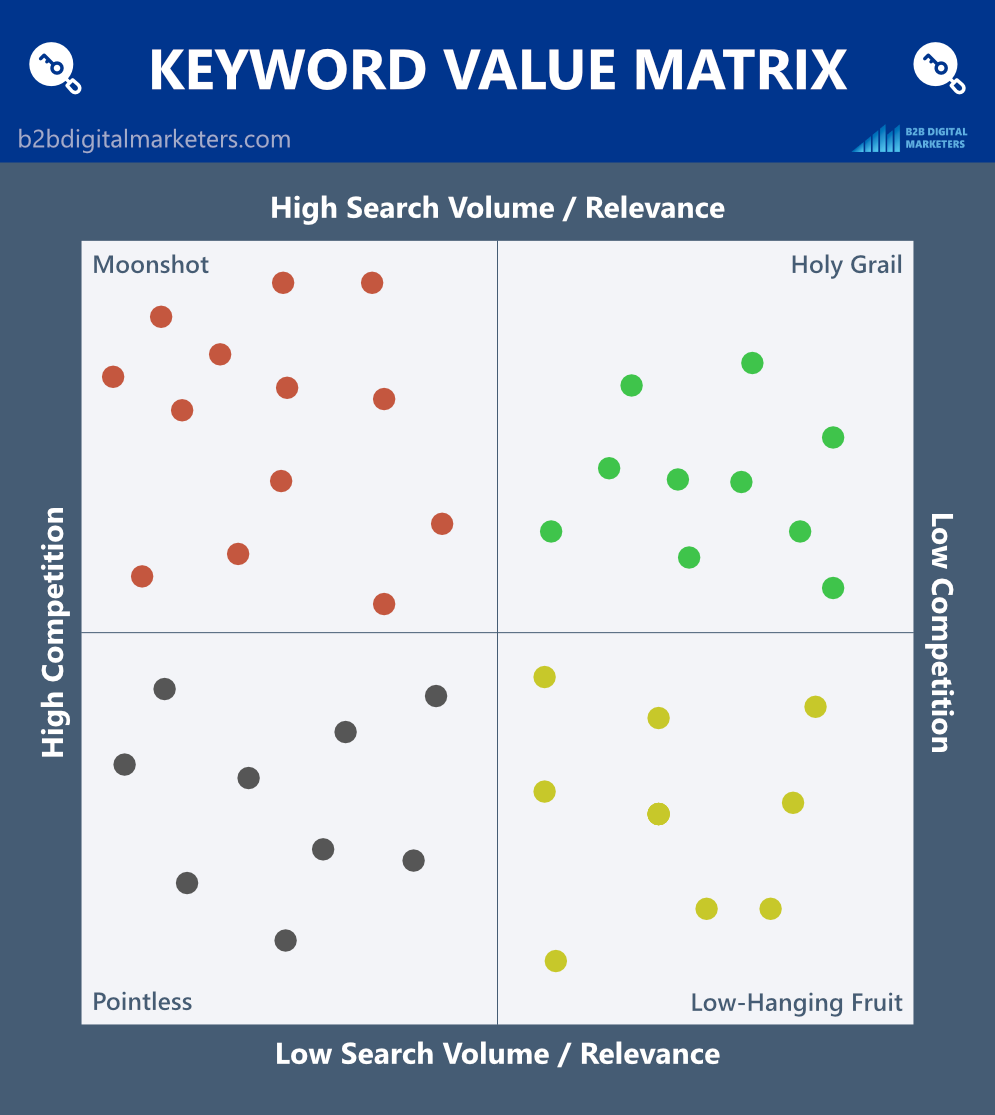
This will help you target your keywords in a more organized and systematic approach. Obviously, you will want to start with:
- Holy Grail keywords: These are the best keywords you can potentially target as they are highly relevant to your business and have high search volume as well as they are low competition keywords. Usually, these keywords are very rare.
- Low-hanging fruit keywords: While less relevant with less search volume, they are still great keywords to target. Usually, here you can have a nice list of keywords.
- Moonshot keywords: These keywords are having large search volume and are highly relevant to your business. However, they are also very competitive and hard to get. Usually, these will be the best keywords in your industry you really want to rank for.
- Pointless keywords: These keywords are very competitive but with very small search volume or relevance to your business. Therefore, there is no point to target them. If you have done your B2B keyword research well, not many should be here.
Also, before you start creating content based on your Keyword Value Matrix, I recommend you target all the keywords from your main topic cluster and then go from there unless the topic cluster is too big with 20+ keywords, then you might need to consider creating Keyword Value Matrix for your niche cluster.
How to Prioritize Keywords with Keyword Value Matrix?
In order to put your keywords in the keyword value matrix, you need to collect data and conduct keyword analysis: The data that you need to collect will be:
- Search volume: This is the total number of monthly searches the keyword gets. You can easily get this from your B2B SEO tool.
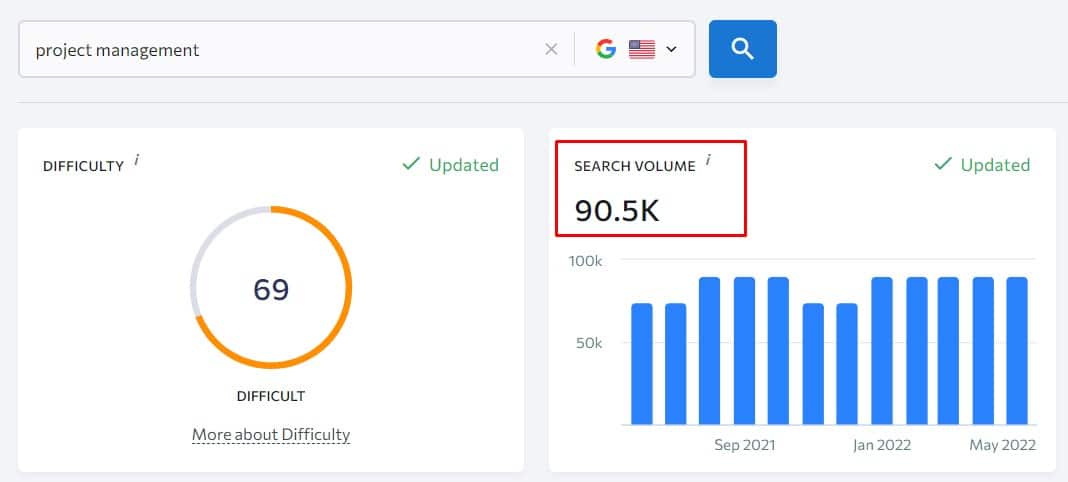
- Business Relevancy/Potential: This is how relevant is the keyword to your business on a scale of 0-3 where 0 means absolutely no relevance at all and 3 is super relevant to your business.
- Keyword Difficulty: This is how difficult the keyword is based on your current website authority and ranking keywords. Obviously, for high authority websites, the KD will be different than for less authority websites as it is calculated on individual cases.
With that, let me show you how you can establish keyword relevancy and benchmark your keyword difficulty.
Establish Keyword Relevancy
First, you want to establish the keyword relevancy on a scale of 0-3, 0 means not relevant at all, and 3 means it’s all about my product.
And to do that, you must ask yourself:
- Is this keyword relevant to my business?
- Would be the users interested in my solution?
- Can I naturally include my solution within the post?
- And are they ready to buy? AKA where are they in the buyer journey?
Use this infographic to better understand. So, ask yourself these questions to give each B2B keyword a relevancy score.
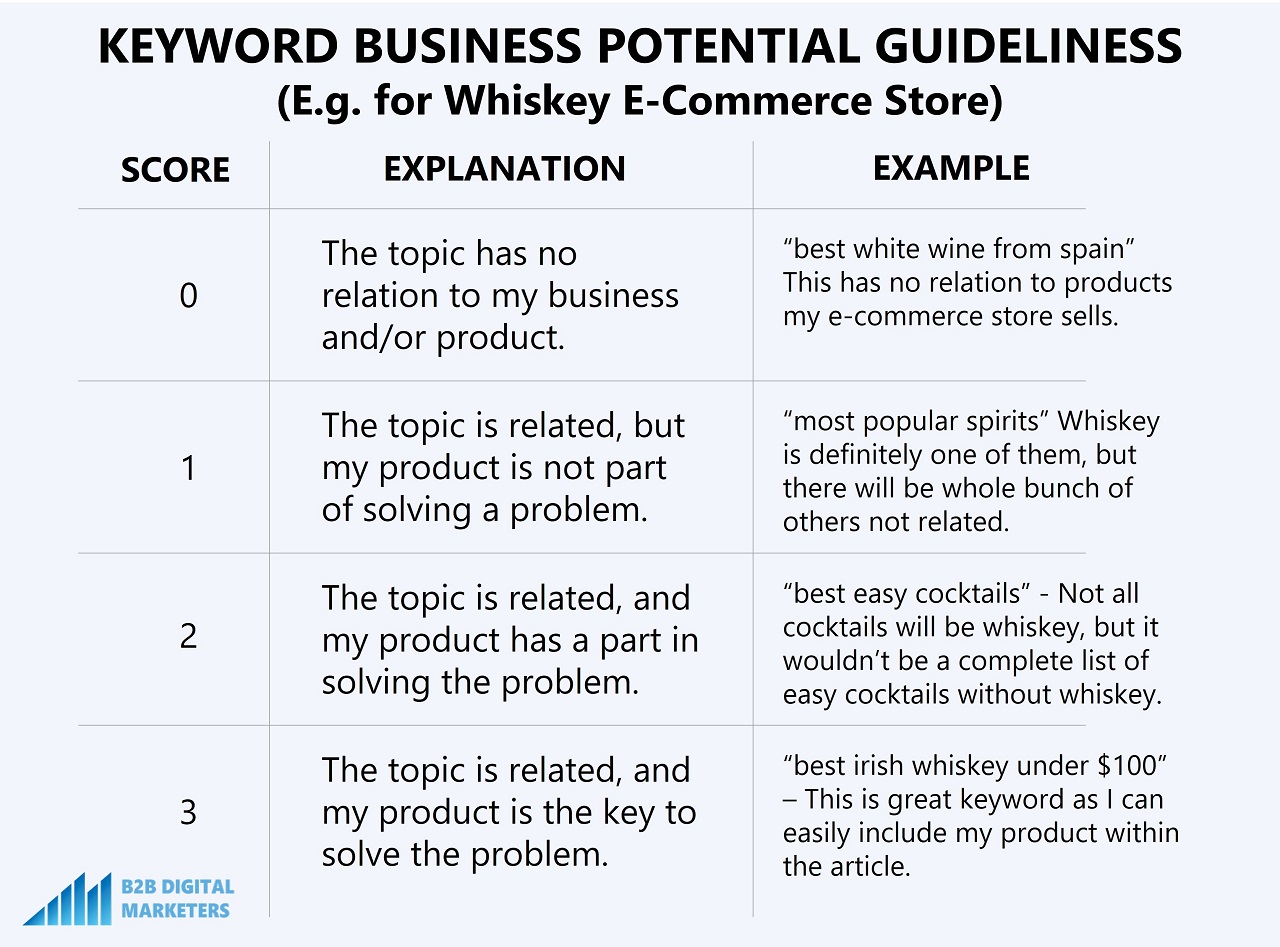
Also, I recommend creating a 3 Keyword Value Matrix for every keyword relevancy score.
Benchmark your keyword difficulty
When it comes to benchmarking keyword difficulty for your website, there are millions and one ways to do it and every way gets more complicated.
However, here I’ll give you a faster and easier way to benchmark keyword difficulty for your website.
This is how you do it:
- Analyze your website with SE Ranking Competitive Research tool.
- Go into the Organic keyword report and add a filter for keywords ranking from 1-7. (This is because Google rarely displays 10 search results on the first page of Google)
- Export all the keywords.
- Calculate the average keyword difficulty score.
- Calculate the median keyword difficulty score. Preferably use this as your benchmark.
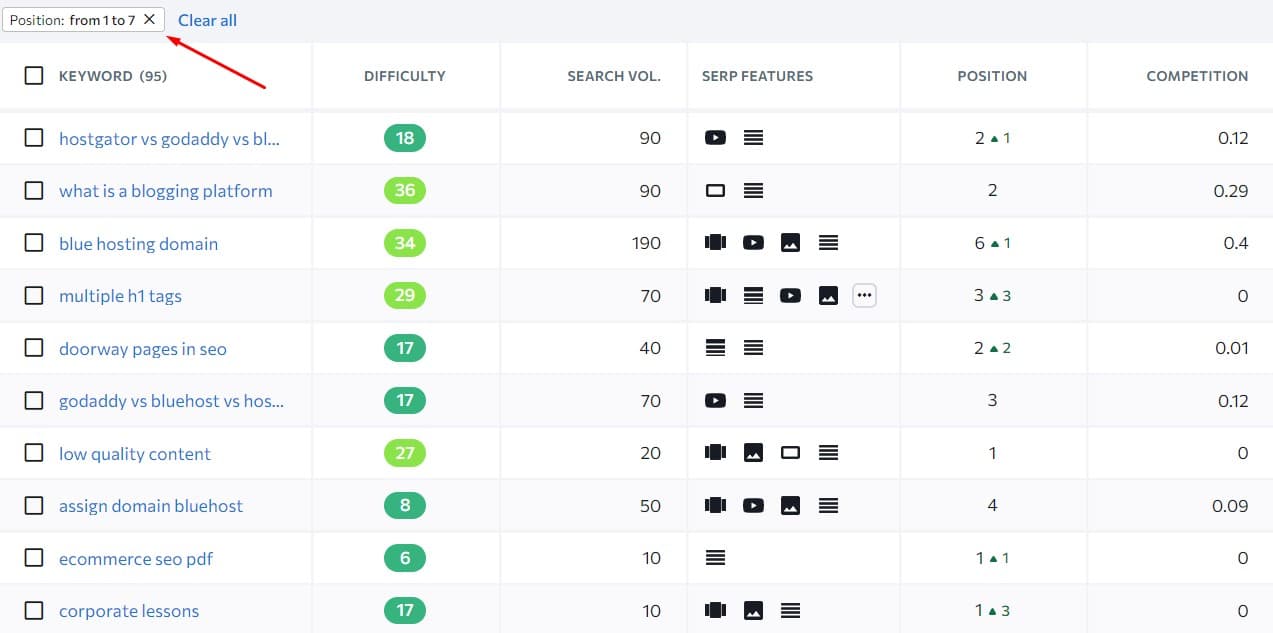
And based on this you will create your keyword value matrix and anything above your median keyword difficulty will be considered as high competition for you.
For example, if your benchmark keyword difficulty is 30, then any keywords with keyword difficulty < 30 are considered in the low competition matrix while keywords with KD > 30 are considered in the high competition matrix.
Also, if your median benchmark for search volume is 15k, then any keyword with search volume > 15k is in high volume metrics and keywords with search volume < 15k are in the low search volume matrix.
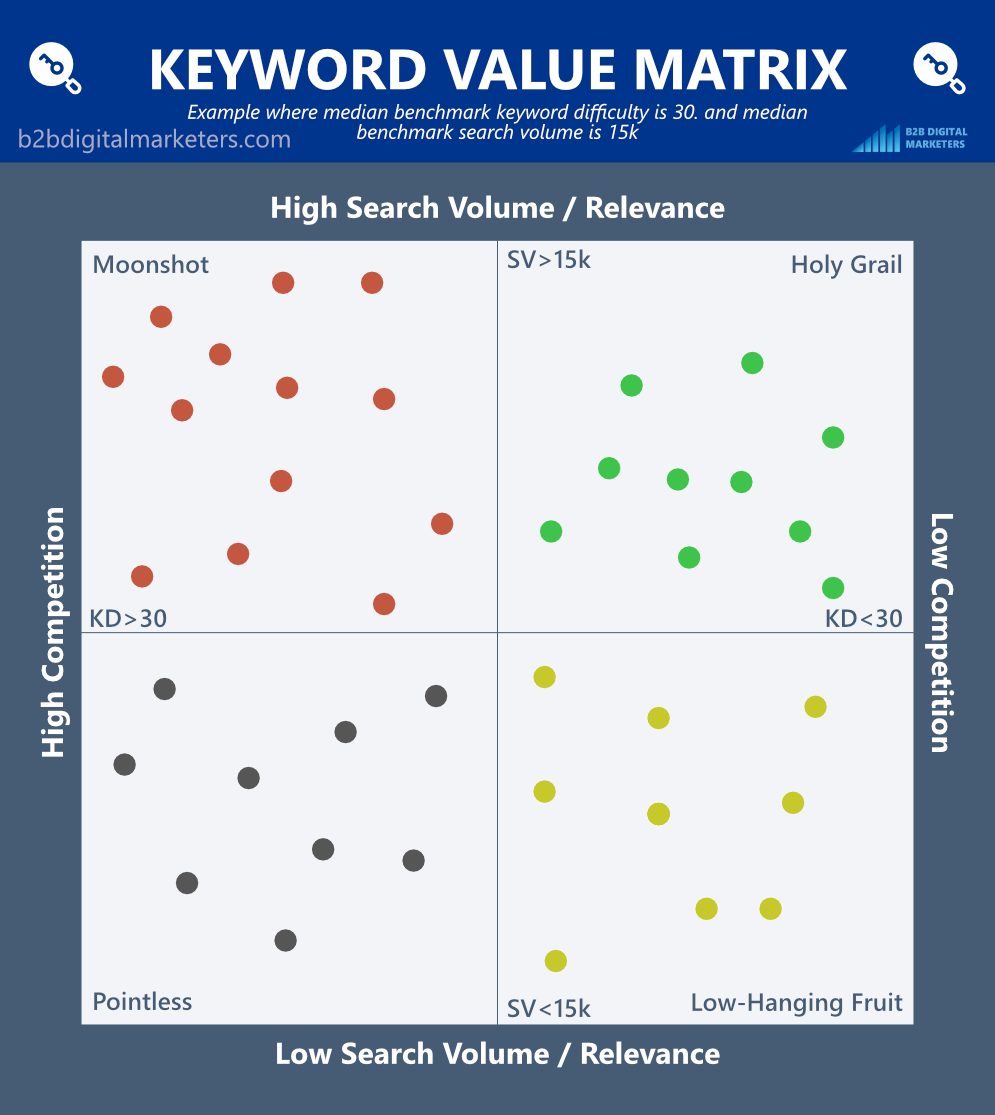
Lastly, if you are not having enough ranking keywords (at least 50+) to establish your keyword difficulty, then I recommend setting the median keyword difficulty as half of your website authority.
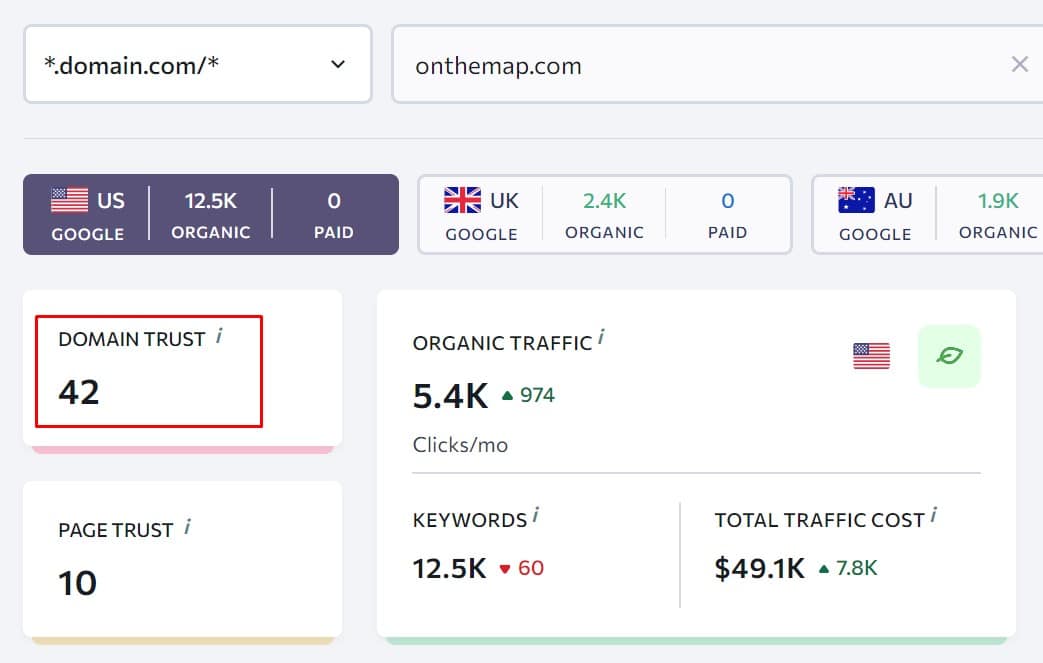
Challenges of B2B Keyword Research
As much as I would like the B2B keyword research to go according to plan, unfortunately, you might be facing challenges while doing B2B keyword research. Some more common you might experience include:
Selecting Wrong Category
Every product or service can be categorized under different categories, but what you want to focus on is selecting the right category your B2B target audience would be using to find your product.
For example, if you are selling SaaS project management software, then the right keyword category to create a topic cluster is “project management” and an example of the wrong keyword category would be “saas software”.
So, make sure you are using the right keyword category for your product or service that your potential customers are using to find your product or service.
Expanding Too Far
For example, QuickBooks are focusing on entrepreneurs and small business owners, but they do not write articles on marketing even thou their target audience might probably be searching for marketing advice and having challenges with marketing.
However, their product is not related to marketing whatsoever, and those that are searching for marketing advice such as SEO, lead generation, email marketing, et cetera. Would be more likely to purchase products related to this industry such as email automation software, SEO software, or other lead generation software rather than accounting and tax software.
Just like if they would be searching for tax or accounting articles, then obviously marketing software wouldn’t be something they would be interested to buy, but rather accounting software would be more suitable in this situation.
Not Customizing This to Your Industry
Not every B2B industry is the same and there is no exact blueprint for how you should do your keyword research. For example, the manufacturing industry might not be exactly targeting keywords related to their B2B Target Audience.
For example, a textile manufacturing B2B company producing different styles of grocery and food bags will not be creating content to attract a target audience from Purchasing department because only very few people in Purchasing department would be interested in their offer.
Unlike project management software where almost every single person in project management will be using some kind of project management software.
That’s why creating brand awareness this way will not be as effective and you should rather focus on keywords related to your products, manufacturing niche, the type of equipment, question-based related keywords, FAQs of your customers, and most importantly location-based keywords for your product or services.
Small B2B Keyword Database
Another common B2B keyword research challenge you might experience is a small B2B keyword database for your industry.
When it comes to some of the more specialized industries, there might be only a few keywords available that you can target.
This is because the industry is highly specialized or small and obviously not many people are working in the industry for the keyword database to get bigger.
Or the B2B keyword database can be small for your target location. This could be because the keyword research tools don’t have enough data for the location or just because there are not many people interested in or working in the industry.
Or a combination of both factors, in such cases you should still try to implement your B2B SEO strategy, as sometimes it could be, that the keyword research tool doesn’t have enough data.
So, do your keyword research, start targeting keywords and as you start ranking for more keywords, you can use that to keep expanding your keyword list.
Low Search Volume of B2B Keywords
And the last B2B keyword research challenge I want to mention is quite common and that is low search volume for your B2B keywords.
Unlike in B2C type of industries where low search volume keywords are considered anything below 1,000 or for some even 10,000, in the B2B industry, you will experience a lot of your keywords will have search volume around 10-50.
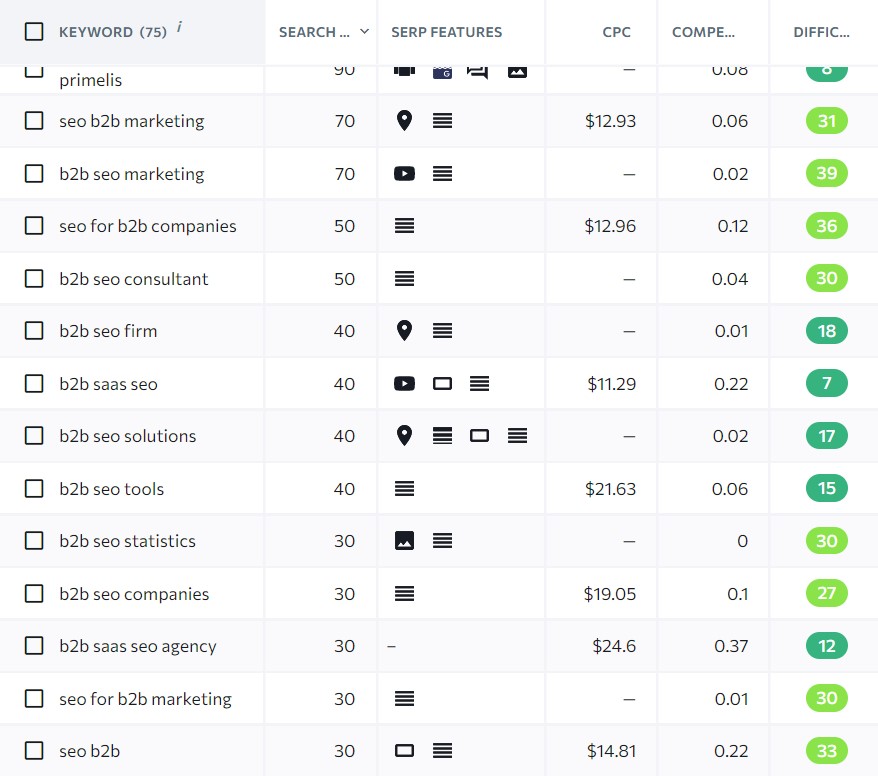
However, don’t worry about that, as these keywords convert quite well and can generate millions in sales opportunities.
Also, sometimes this could be because the keyword research tool doesn’t have enough data to accurately estimate the search volume and in some cases, a keyword with a search volume of 50 can easily bring hundreds of users to your website.
So, don’t get scared about the small search volume, remember it is about the quality, not quantity, and B2B keywords tend to be very profitable in terms of the ratio of users they bring and conversions.
Final Advice
When it comes to the B2B keyword research process, there is no exact blueprint to do so, as you just need to know different keyword research techniques to find keywords and then record those keywords in your keyword spreadsheet.
Also, when it comes to prioritizing keywords to target, there are many variables you need to consider, but generally starting with the most relevant keywords to your products or services and following the Keyword Value Matrix will bring you great results.
However, of course, you might need to target different keywords for relevancy purposes. This is when common sense is important as well when deciding which keywords, you want to target.
But besides that, this B2B keyword research process always helps me to start with B2B keyword research in any industry and then adjust as I learn more about it.
And as you start targeting keywords to implement your B2B SEO, make sure you follow the latest B2B SEO best practices to maximize the results.
I hope you have learned something new, did I forget something, did you like something particular in this article? Let me know on my YouTube channel, CAU!
Related Articles:
- What is B2B SEO and Why Do you Need SEO for B2B?
- B2B SEO vs B2B SEM: What’re the Differences and Which Strategy is Better?
- 5 Easy Ways How to Get Google Business Profile Backlinks (AKA Google My Business)
- Blogger Outreach: The Right and Not Spammy Way
- How to Add Keywords in WordPress? [Guide for Beginners]
- How to Conduct B2B SEO Audit with SEO Checklists
- 11 Best Ways How to Make Money with SEO
Also, check out our SEO hub page to find all our SEO resources.
Disclaimer
This article was created by Eduard Dziak and may contain affiliate links. The following were used to optimize the article for the best user and search engine experience include:
- SE Ranking for keyword research and on-page SEO optimization
- Surfer SEO for SEO-friendly content creation for users and search engines.
- Jasper AI for grammar correction and information enhancement.
The article is based on the author’s own experience and knowledge, drawn from both their own work and that of their clients, to provide the latest, proven methods.








